Arkansas Documents
Quitclaim Deed
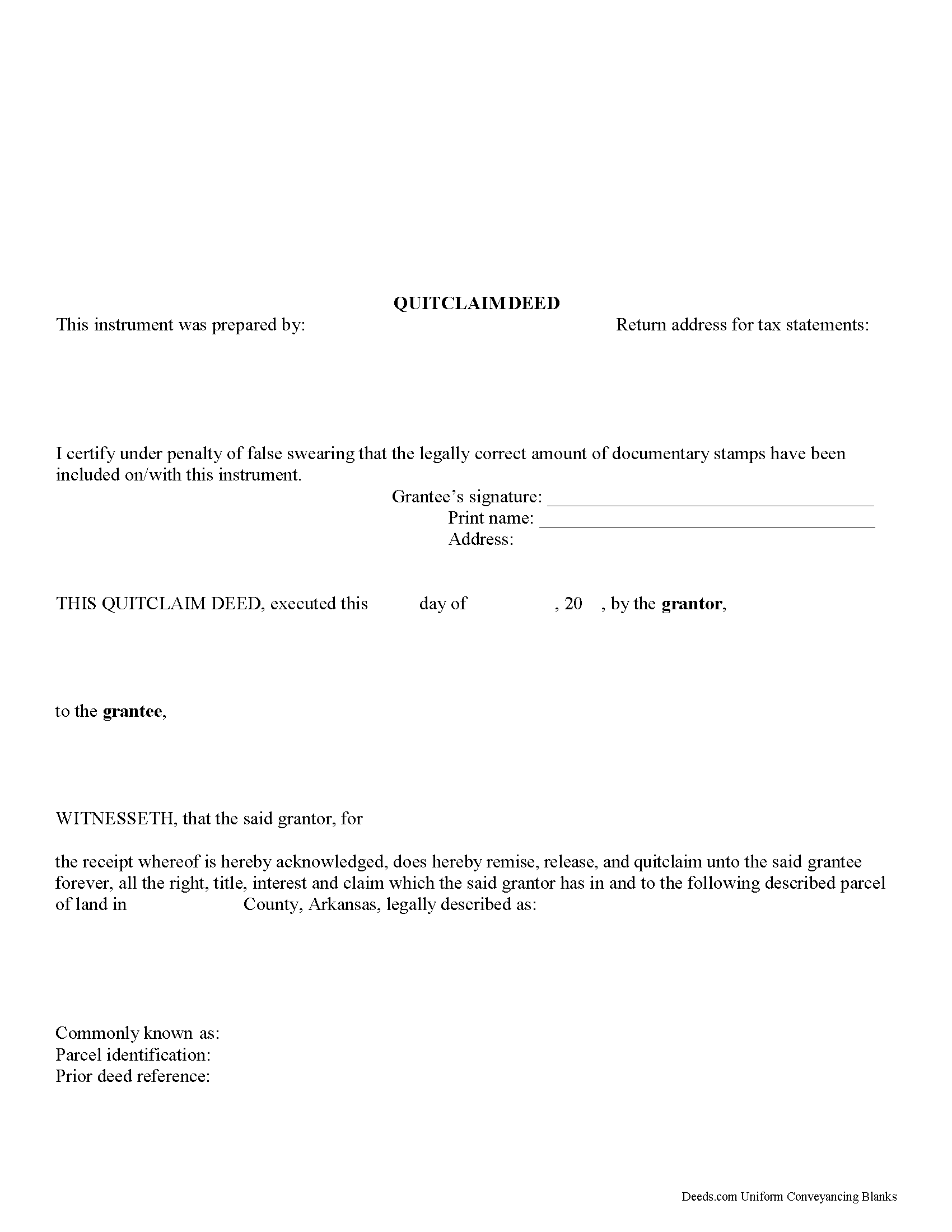
A validly executed Arkansas quitclaim deed must meet specific statutory obligations.
Content:
The Arkansas statutes explain that any document conveying rights to real property must be in writing; contain a heading or title describing the purpose and intent of the instrument (in this case Quitclaim Deed) and; provide the name, marital status, address and signature of grantor. While the grantor's marital status is not expressly required, A.C.A. 18-12-403 (2012) states that no instrument conveying the homestead of any married person is valid unless his or her spouse joins in the execution of the instrument, or conveys by separate document, and acknowledges it. If the property conveyed is NOT classified as a homestead, only the grantor must sign unless the spouse is on the original deed as a co-owner.
Avoid using the terms "grant, bargain, and sell," because they contain an express covenant of warranty to the grantee. Including a warranty changes the nature of the deed from a simple quit claim. See A.C.A. 18-12-102 (2012).
The quit claim deed must also contain the name, address, and vesting decision (how title will be held) of the grantee and a description and address of th... More Information about the Arkansas Quitclaim Deed
Gift Deed

Gifts of Real Property in Arkansas
Gift deeds convey title to real property from one party to another with no exchange of consideration, monetary or otherwise. Often used to transfer property between family members or to gift property as a charitable act or donation, these conveyances occur during the grantor's lifetime. Gift deeds must contain language that explicitly states that no consideration is expected or required. Ambiguous language, or references to any type of consideration, can make the gift deed contestable in court.
A lawful gift deed includes the grantor's full name and marital status, as well as the grantee's full name, marital status, vesting, and mailing address. Vesting describes how the grantee holds title to the property. Generally, real property is owned in either sole ownership or in co-ownership. For Arkansas residential property, the primary methods for holding title in co-ownership are tenancy in common and joint tenancy. Arkansas does not recognize community property. Real estate conveyed to two or more people is presumed as tenancy in common, unless a joint tenancy is specified (A.C.A. 18-12-603).
As with any conveyance of realty, a gift deed re... More Information about the Arkansas Gift Deed
Warranty Deed
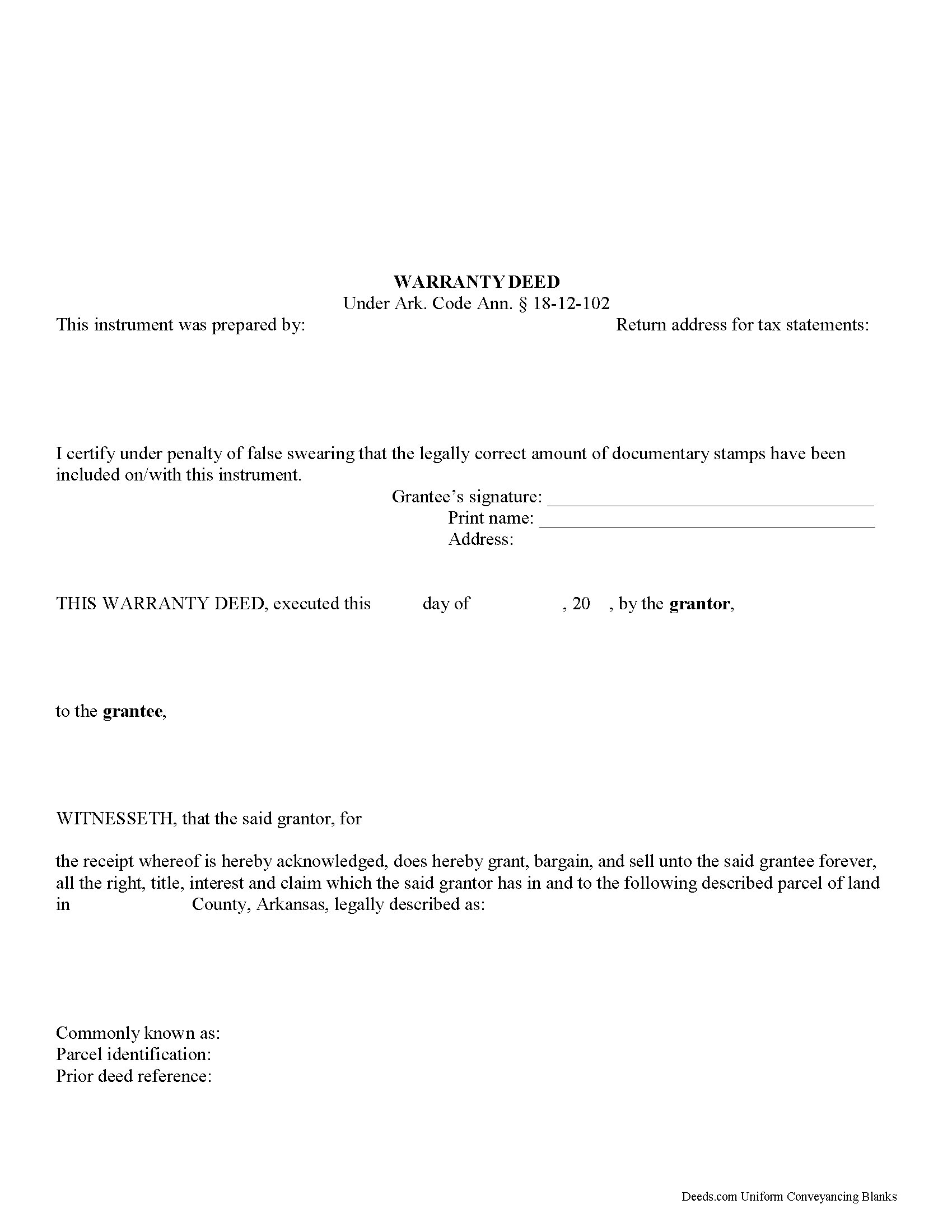
All lands, tenements, and hereditaments in Arkansas can be alienated and transferred by a deed in writing. A warranty deed can be used to transfer possession of real estate in Arkansas and offers the guarantees that the grantor holds clear title to the real state and also has the right to sell it.
A warranty deed employs the words "grant, bargain, and sell," which are an express covenant to the grantee, his or her heirs, and assigns that the grantor possesses an indefeasible estate in fee simple; free from encumbrances done or suffered by the grantor, except any rents or services that are expressly reserved by the deed; and also for the quiet enjoyment thereof against the grantor, his or her heirs and assigns; and from the claim and demand of all other persons, unless limited by specific language in the deed ( 18-12-102). After-acquired title will pass to the grantee in a warranty deed and will be valid as if the legal or equitable estate had been in the grantor at the time of conveyance ( 18-12-601).
As between the grantor and grantee to a warranty deed, neither the statutory nor general express covenant of warranty against encumbrances is held to cover taxes or assessments... More Information about the Arkansas Warranty Deed
Special Warranty Deed
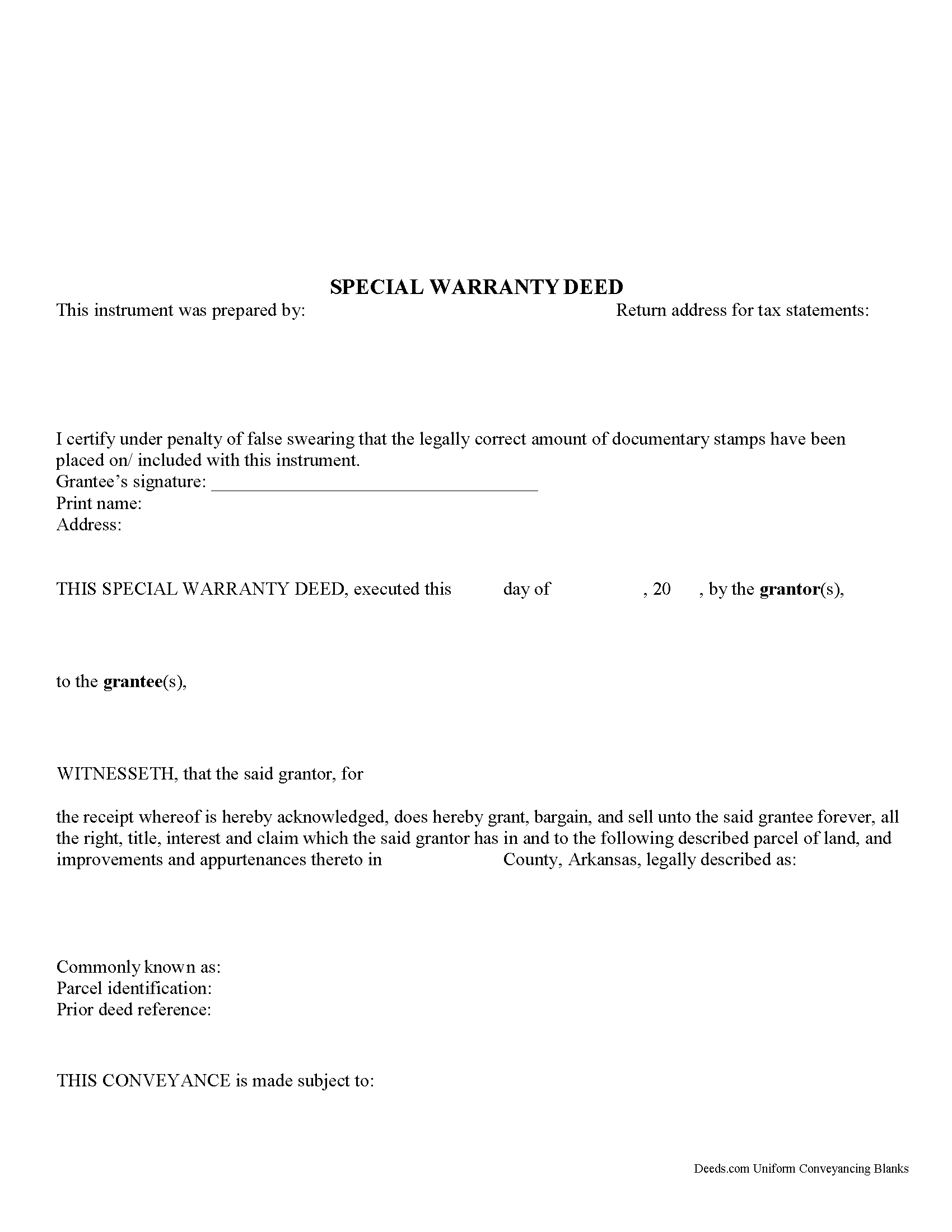
A special warranty deed will be valid if it conforms to the statutory requirements for a conveyance set forth in the Arkansas code.
Special warranty deeds can be used to convey title to real property in Arkansas. This type of real estate deed can be used when the grantor does not want to offer the same covenants of warranty as presented in a general warranty deed. Express covenants are created by the use of the words "grant, bargain, and sell," which are an express covenant to the grantee that (1) the grantor is seized of an indefeasible estate in fee simple, free from encumbrances done or suffered by the grantor except rents or services that may be reserved by the deed, (2) for the quiet enjoyment thereof against the grantor and his or her heirs and assigns, and from the claim and demand of all other persons, unless limited by express words in the deed ( 18-12-102). In a special warranty deed, a grantor covenants to defend the title only against the claims and demands of the grantor and those claiming by, through, or under him.
A special warranty deed and all other instruments of writing for the conveyance of real estate in Arkansas should be executed in the presence of two ... More Information about the Arkansas Special Warranty Deed
Grant Deed
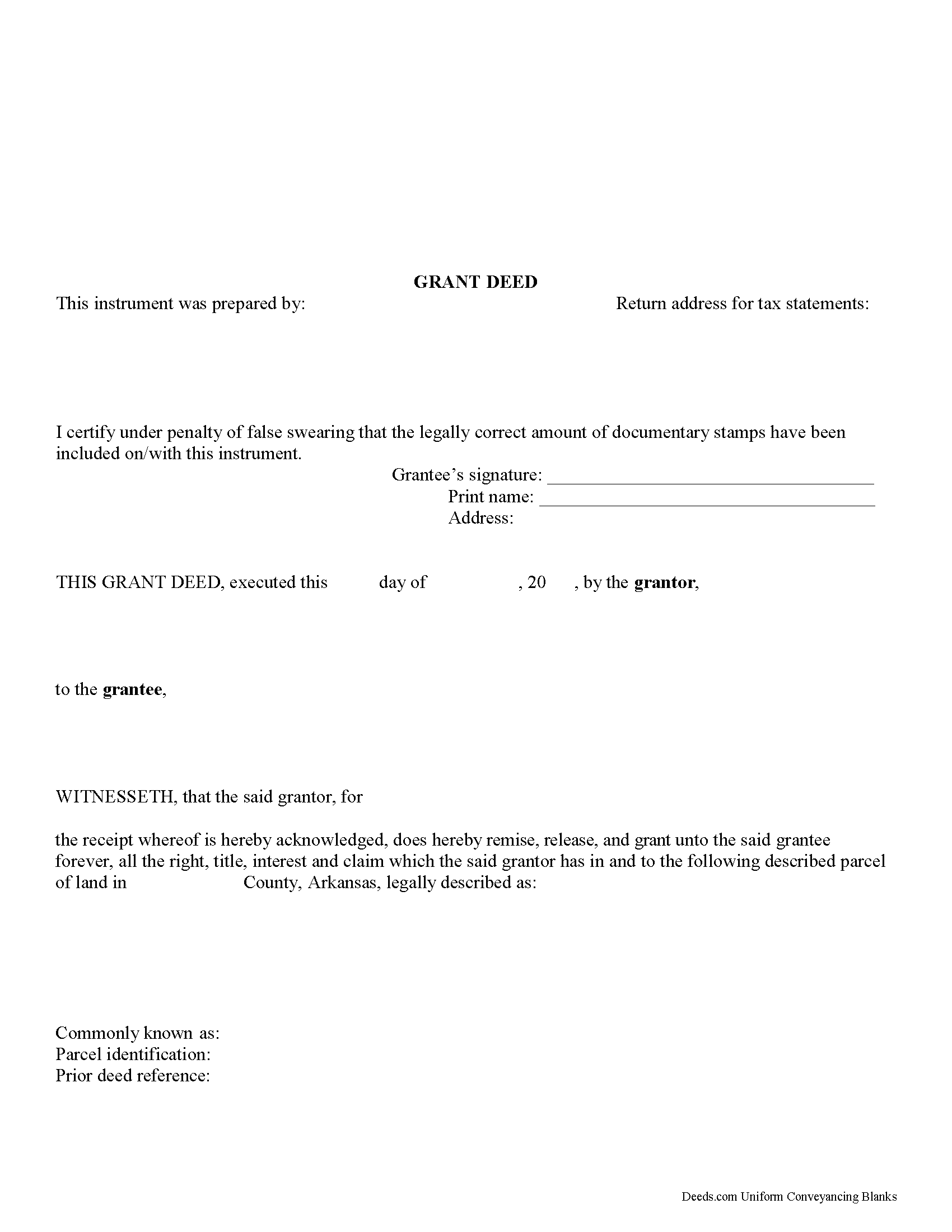
All possession of real estate, tenements, and hereditaments in Arkansas can be transferred by a deed in writing. A grant deed in this state is often used by an owner of real property to grant all his/her interests and rights in the property to another person or entity.
A duly executed grant deed contains the guarantees that the grantor has not conveyed the land to any person other than the grantee and that the grantor has not encumbered the property with a lien. A grant deed in Arkansas is similar to a warranty deed, but does not include the further assurances that are present in a warranty deed ( 18-12-102).
A grant deed in this state must be duly acknowledged or proved by an authorized officer before it can be accepted for recording ( 18-12-201). All grant deeds and other instruments in writing for the conveyance of real estate are required to be acknowledged or executed in the presence of two witnesses who are not otherwise involved in the transaction, or acknowledged by the grantor in the presence of two such witnesses, who should then subscribe the deed. If the witnesses do not subscribe the grant deed as described at the time of execution, the date of their subscribin... More Information about the Arkansas Grant Deed
Scrivener's Error Affidavit
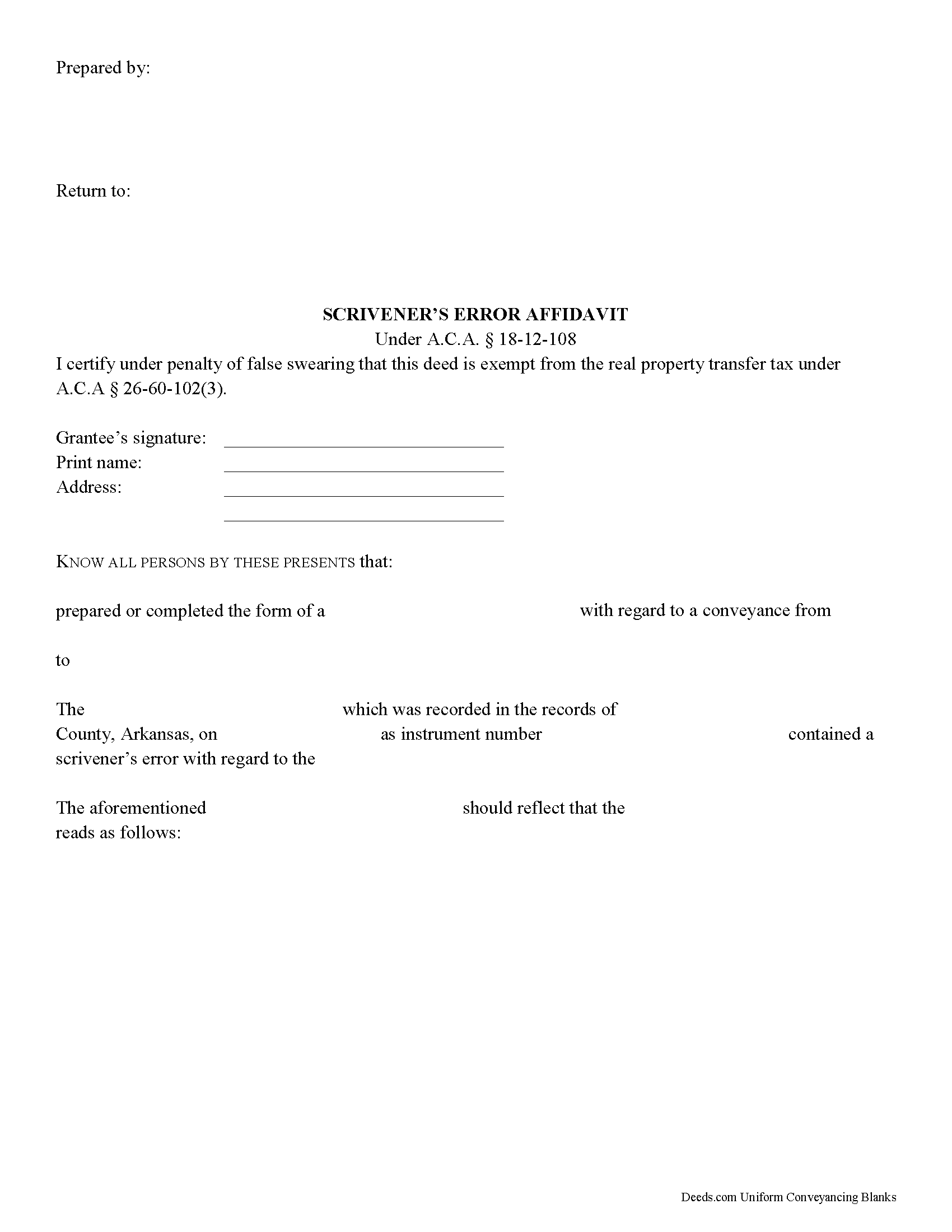
Scrivener's Error Affidavits in Arkansas
What happens when an important document like a deed or a mortgage has been recorded, and an error is spotted after the fact? What can you do to fix it? One option may be filing a corrective scrivener's affidavit.
A scrivener's affidavit is an instrument containing sworn statements by the affiant, or person making the affidavit, that sets forth the intent of the original document by correcting a non-material error in a document which has been recorded at an earlier date. The Arkansas statutes specifically state that scrivener's affidavits may be used to correct the following: the identification, marital status, heirship, relation, death, or the time of death of a person; the identification of a corporation or other legal entity;or the legal description to real property (A.C.A. 18-12-108).
Major, or material, changes to the substance of the document have a legal effect in how property is titled, and therefore require a new deed. Adding or removing a grantee, for example, or making significant modifications to the legal description, may require a new document. When in doubt about the gravity of an error and the appropriate vehicle to a... More Information about the Arkansas Scrivener's Error Affidavit
Statutory Durable Power of Attorney
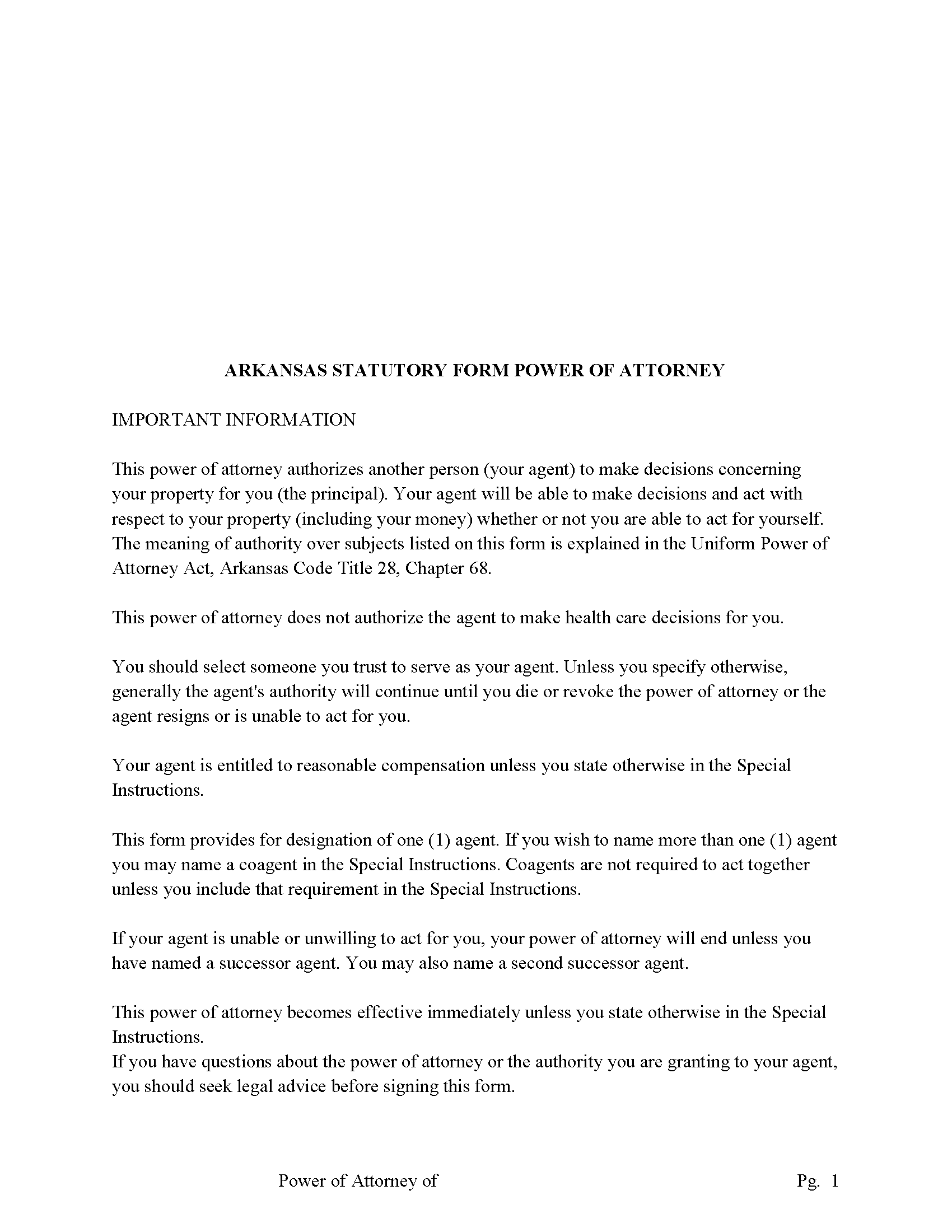
This is a statutory power of attorney following Arkansas code Title 28, chapter 68, (cited as the Uniform Power of Attorney Act.) ( 28-68-101)
In this power of attorney, the principal chooses which acts the agent can or cannot perform, each of these powers are detailed by Arkansas statutes and codes.
Execution of the Power of Attorney
A signature (by the principal) (is presumed to be genuine if the principal acknowledges the signature before a notary public or other individual authorized by law to take acknowledgments.) (AR Code 28-68-105)
Unless otherwise note in the "Special Instructions Section" of the form this power of attorney is durable, meaning (not terminated by the principal's incapacity.) ( 28-68-102(2))
(Arkansas Power of Attorney Package includes form, guidelines, and completed example)
... More Information about the Arkansas Statutory Durable Power of Attorney
Specific Power of Attorney for the Sale of Property
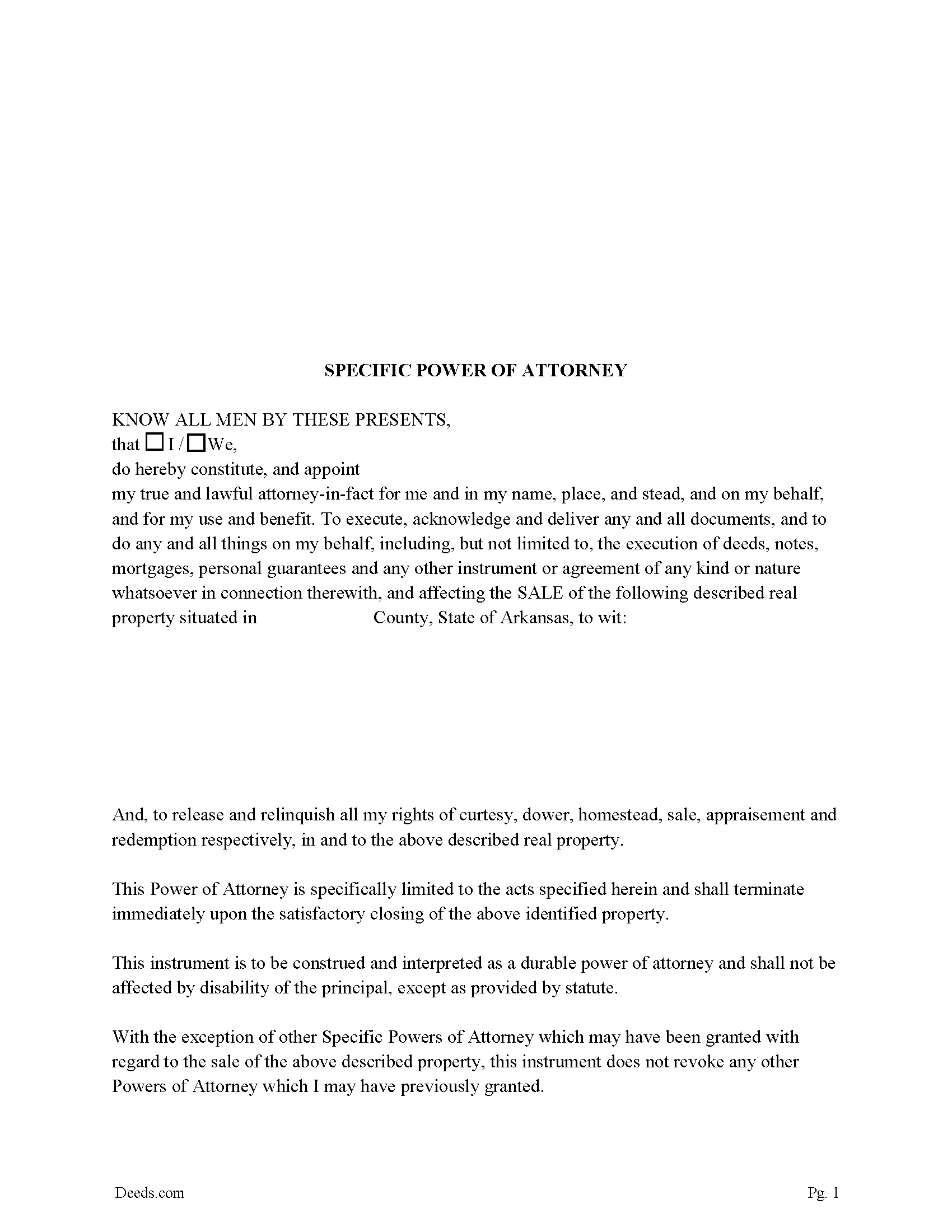
This form is used for the sale of real property located in Arkansas. The principal designates an agent and empowers him/her to act in all necessary legal documents and instruments for the sale of a specific property. The Limited Power of Attorney is durable and shall not be affected by the principle's disability, incompetency, or incapacity and terminates immediately upon the satisfactory closing of the specified property.... More Information about the Arkansas Specific Power of Attorney for the Sale of Property
Limited Power of Attorney for the purchase of Property
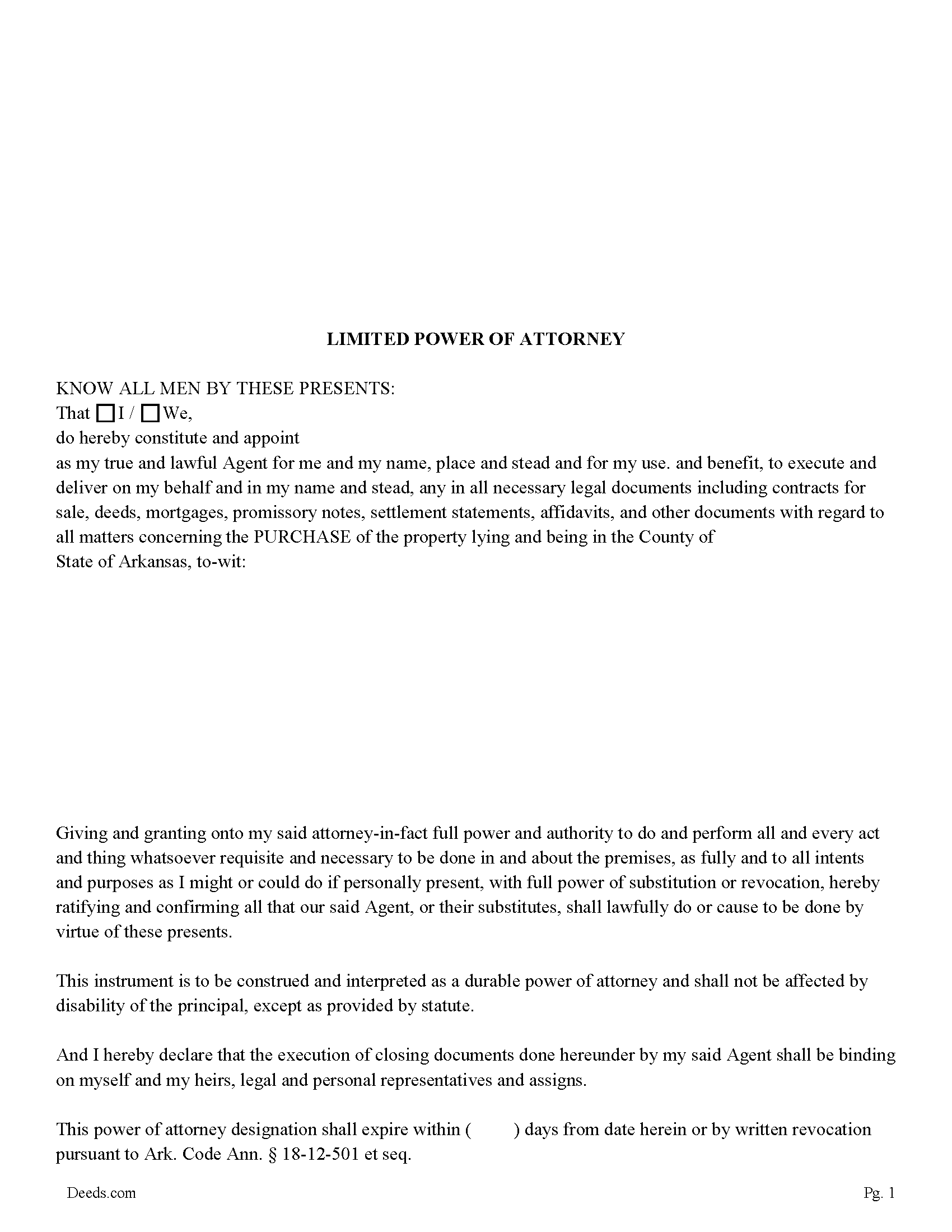
This form is used for the purchase of real property located in Arkansas. The principal designates an agent and empowers him/her to act in all necessary legal documents including contracts for sale, deeds, mortgages, promissory notes, settlement statements, affidavits, and other documents with regard to all matters concerning the PURCHASE of a specific property. The Limited Power of Attorney is durable and shall not be affected by the principal's disability, incompetency, or incapacity although an expiration date can be set by the number of days the power of attorney stays active after its execution or by written revocation pursuant to Ark. Code Ann. 18-12-501 et seq.... More Information about the Arkansas Limited Power of Attorney for the purchase of Property
Mortgage Secured by Promissory Note
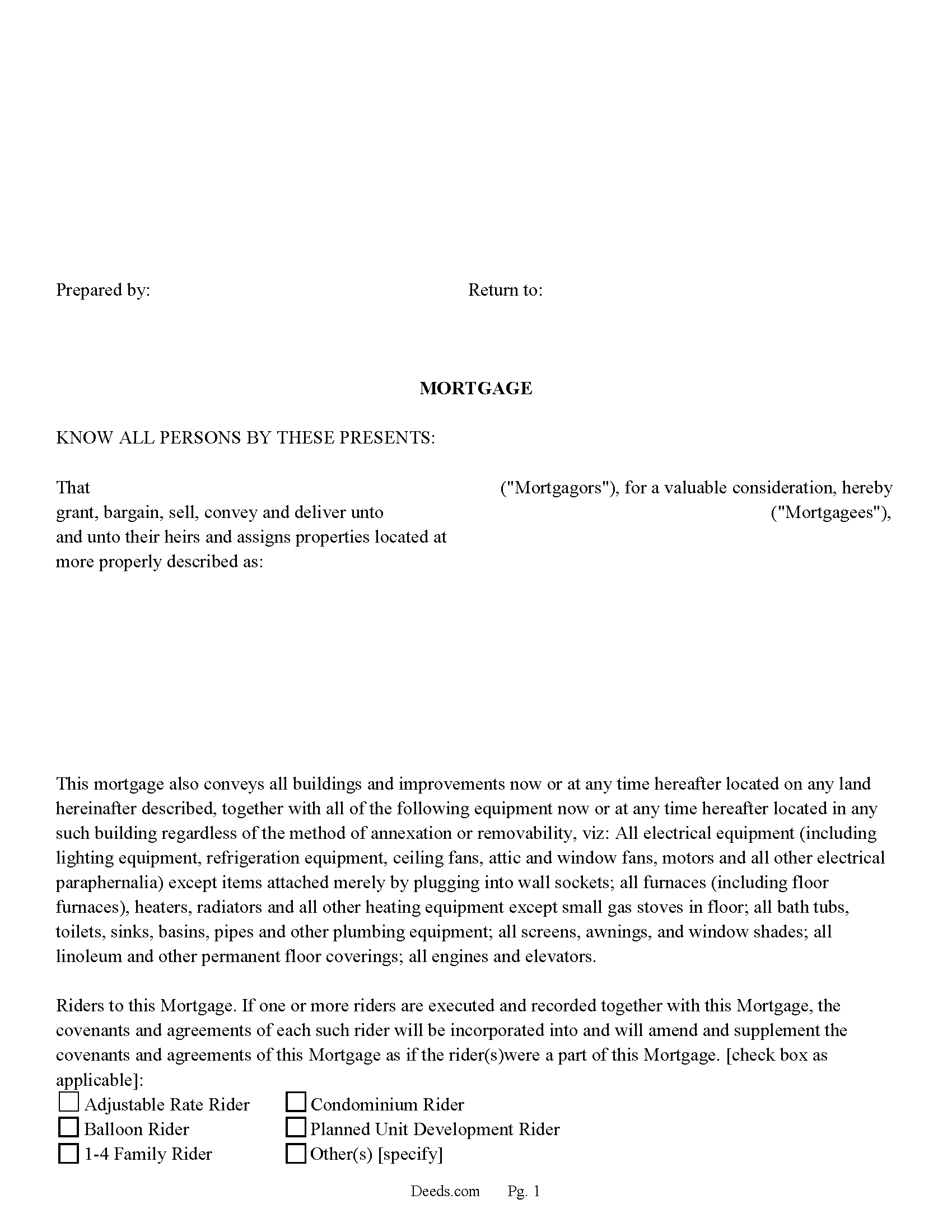
("Mortgage" means the grant of an interest in real property to be held as security for the performance of an obligation by the mortgagor or other person.) (18-50-101 (4))
Once (filed in the recorder's office) the mortgage becomes a (lien on the mortgaged property). (The filing shall be notice to all persons of the existence of the mortgage.) (18-40-102)
The (Mortgagor)/ Borrower grants (an interest in real property as security for the performance of an obligation secured by a mortgage.) (18-50-101 (8))
The (Mortgagee)/Lender holds (an interest in real property as security for the performance of an obligation secured by a mortgage.) (18-50-101 (7))
The borrower must also complete a promissory note. A promissory note is a negotiable instrument that contains an unconditional written promise, signed by the borrower, to repay the lender or its designated agent. It defines the amount and specific terms of the loan between the borrower and the lender (interest rates, default rate, late payment fee, etc.), and must be completed at the same time as the security instrument. Many lenders retain the promissory note for the duration of the mortgage and return it to the borrower afte... More Information about the Arkansas Mortgage Secured by Promissory Note
Satisfaction of Mortgage
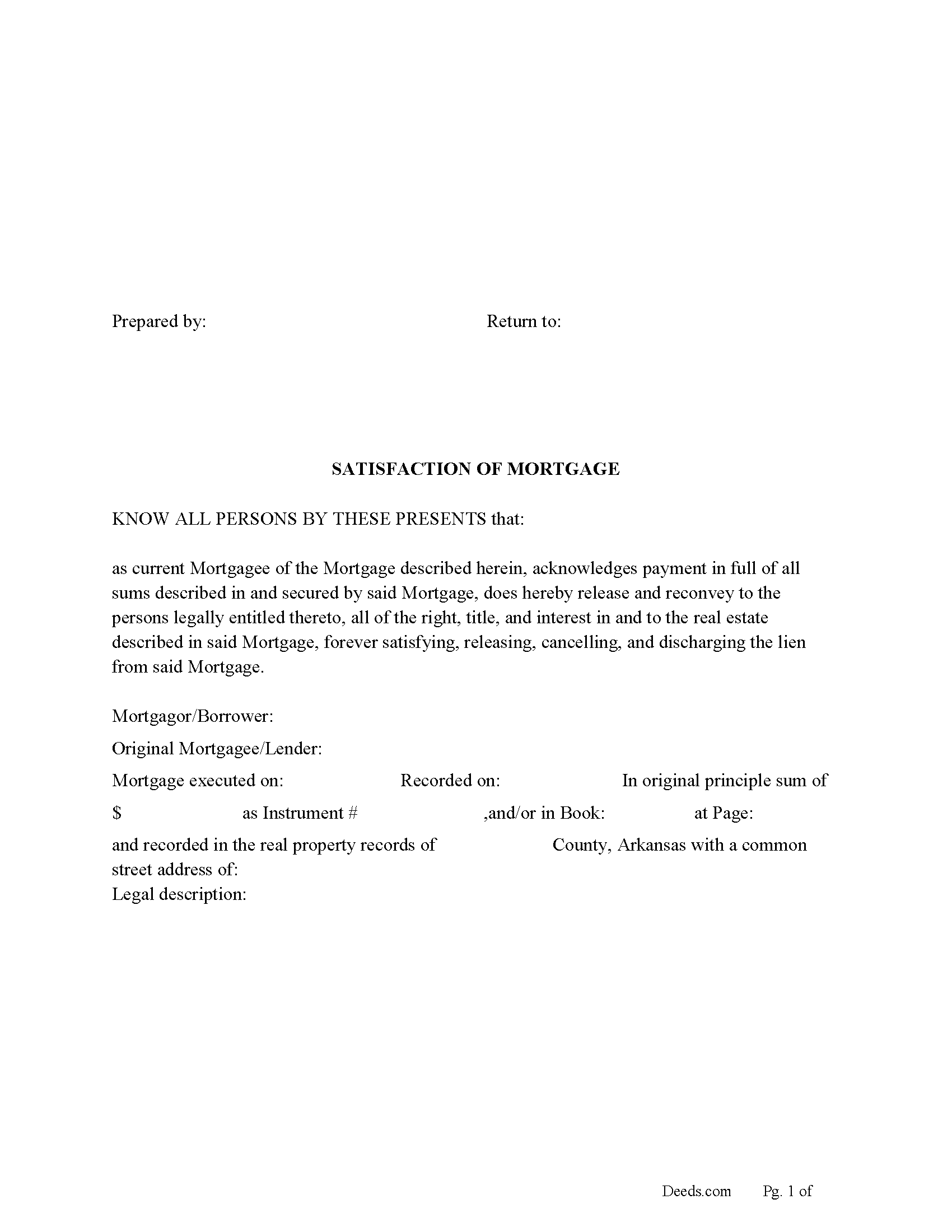
This form is used by the mortgagee/lender or representative to release a mortgage that has been satisfied/paid in full. (If a person receiving satisfaction does not, within sixty (60) days after being requested, acknowledge satisfaction as stated in subsection (a) of this section or request the trustee to reconvey the property as stated in subsection (c) of this section, he or she shall forfeit to the party aggrieved any sum not exceeding the amount of the mortgage money, to be recovered by a civil action in any court of competent jurisdiction.) (Ark Statute 18-40-104(d))
[If a mortgagee or his or her executor, administrator, or assignee receives full satisfaction for the amount due on any mortgage, then at the request of the person making satisfaction, the mortgagee shall acknowledge satisfaction of the amount due on the mortgage on the margin of the record in which the mortgage is recorded.] [18-40-104(a)]
(Arkansas Satisfaction of Mortgage Package includes form, guidelines, and completed example) For use in Arkansas only.
... More Information about the Arkansas Satisfaction of Mortgage
Satisfaction Affidavit
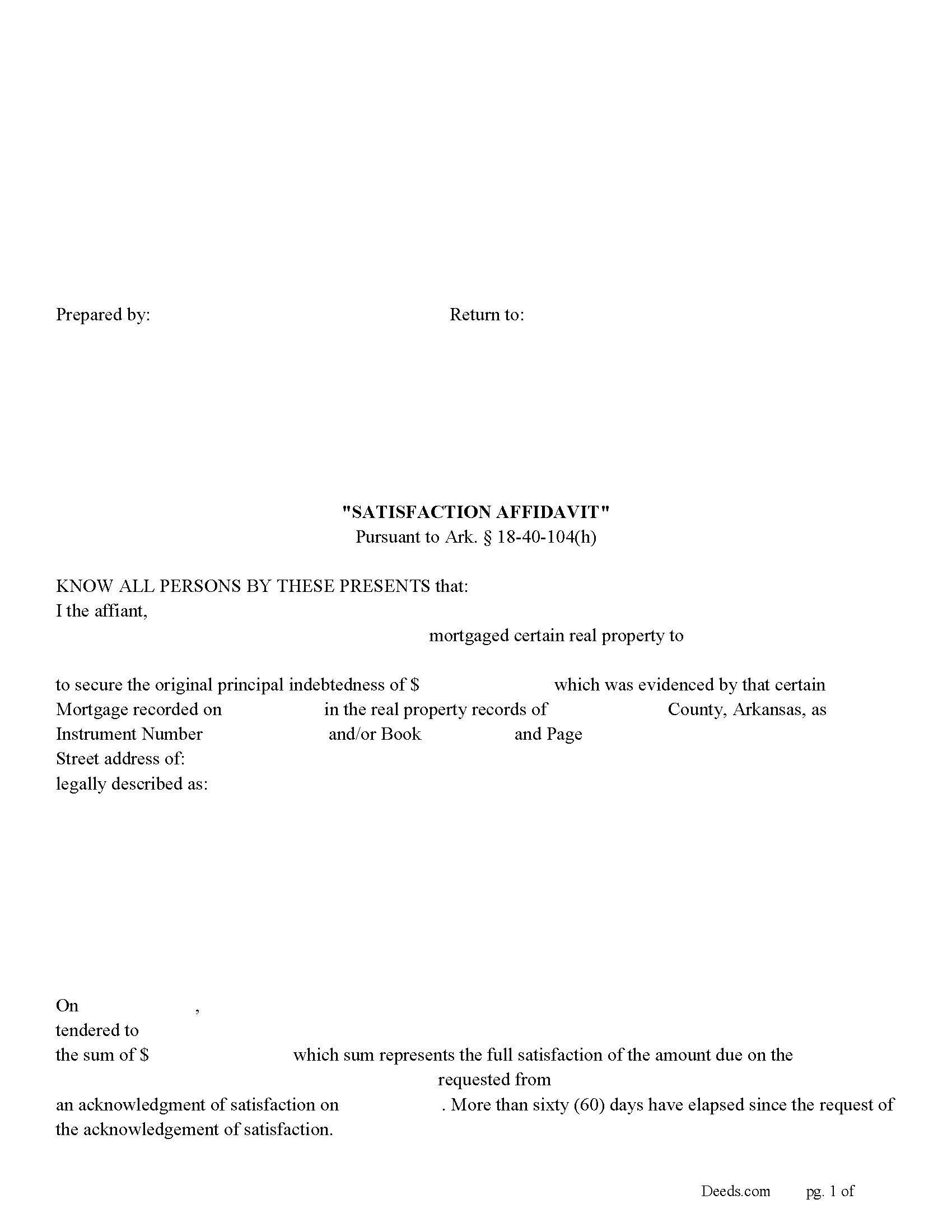
When a mortgage has been paid in full, it is customary for the borrower to request a Satisfaction of Mortgage. When this happens, the current lender will record a "Satisfaction of Mortgage", which notifies the world the lien has been released, cancelled, and discharged from the subject property. Occasionally the lender does not or can not record a Satisfaction of Mortgage. This can be detrimental to the borrower, adversely affecting refinancing, selling and credit ratings- just to name a few. After 60 days an Attorney or Licensed Title Agent can use this "Satisfaction Affidavit" to satisfy the mortgage.
18-40-104 (e) If a person receiving satisfaction does not, within sixty (60) days after being requested, acknowledge satisfaction as stated in subsection (a) of this section or fails to cause the trustee to reconvey the property as stated in subsection (c) of this section, then, in addition to the rights provided in subsection (d) of this section, a satisfaction affidavit may be recorded in the county where the lien is recorded which shall have the same effect as an acknowledgment of satisfaction as stated in subsection (b) of this section or a reconveyance of the property as s... More Information about the Arkansas Satisfaction Affidavit
Deed of Trust and Promissory Note
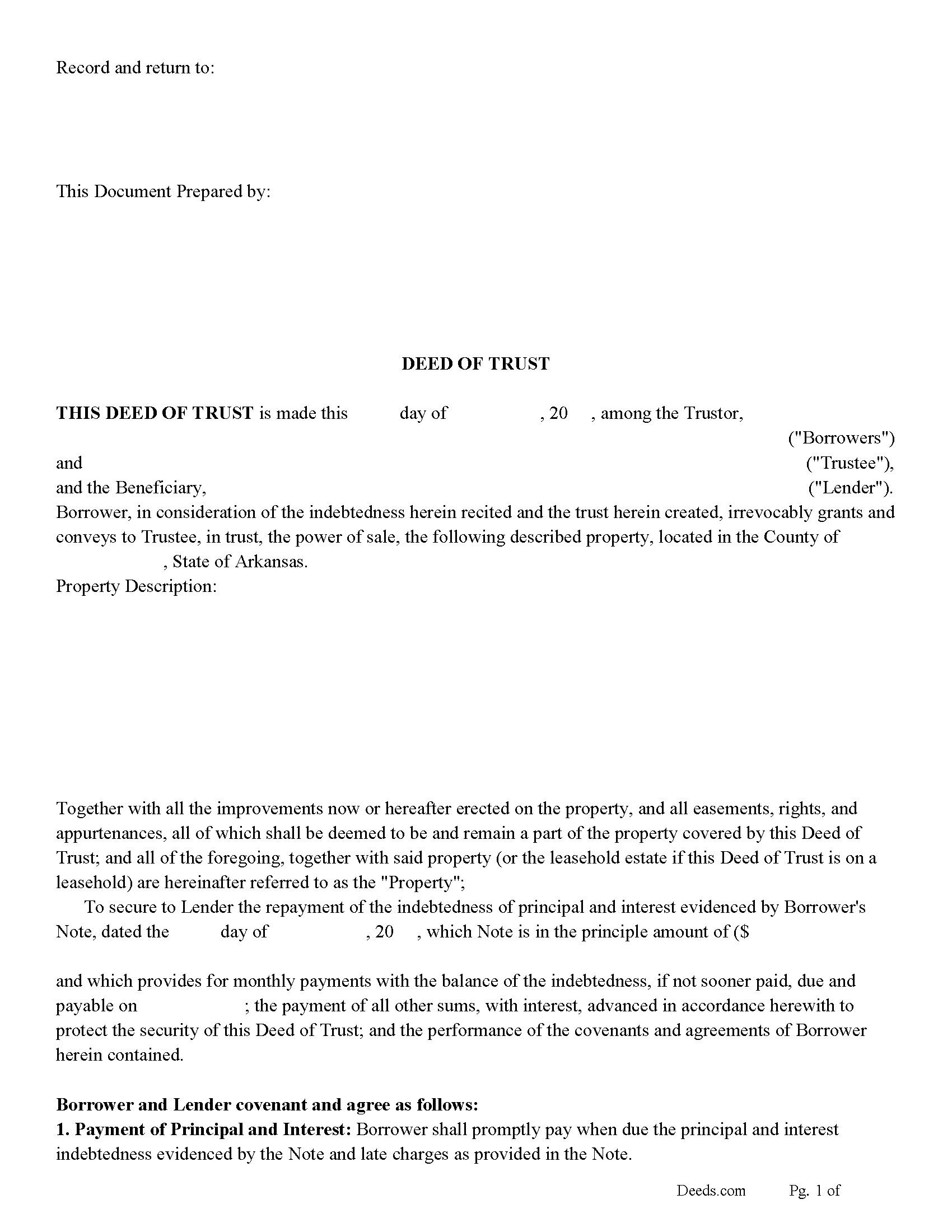
("Deed of trust" means a deed conveying real property in trust to secure the performance of an obligation of the grantor or any other person named in the deed to a beneficiary and conferring upon the trustee a power of sale for breach of an obligation of the grantor contained in the deed of trust;) (Ark. Statute 18-50-101(2)) A power of sale allows for a non-judicial foreclosure in the case of default, saving time and expense. If Lender invokes the power of sale, Lender shall execute or cause Trustee to execute the written notice of the occurrence of any event of default and Lender's election to cause the Property to be sold and shall cause such notice to be recorded in each county in which the Property or some portion thereof is located. Lender or Trustee shall mail copies of such notice in the manner prescribed by applicable law. 18-50-103.
(A trustee may not sell the trust property unless: The deed of trust or mortgage is filed for record with the recorder of the county in which the trust property is situated;) (Ark. Statute 18-50-103(1))
A deed of trust contains three (3) parties: Grantor/Trustor, Trustee, and Beneficiary/Lender
"Grantor" means the person conveying an i... More Information about the Arkansas Deed of Trust and Promissory Note
Deed of Trust with Installment of Taxes and Insurance
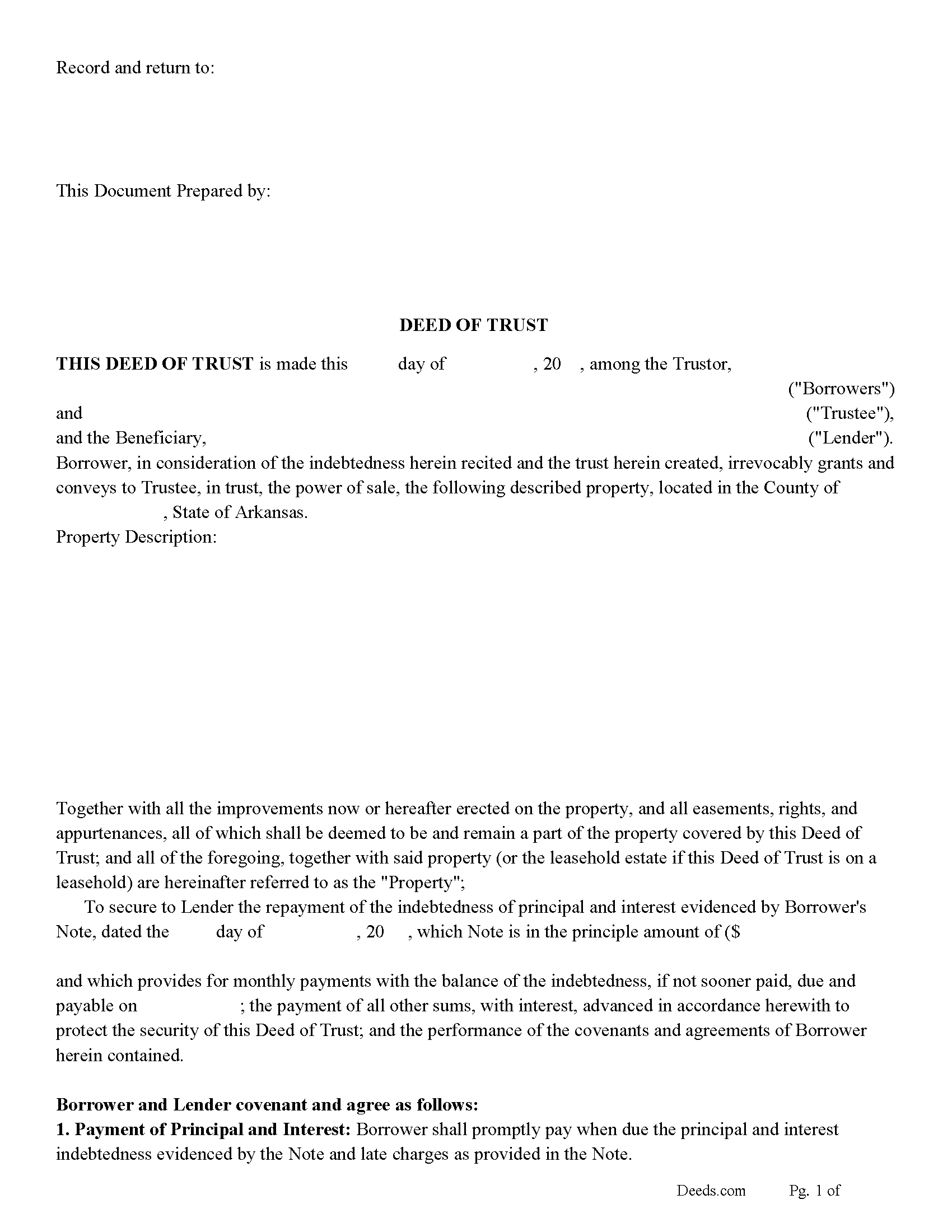
("Deed of trust" means a deed conveying real property in trust to secure the performance of an obligation of the grantor or any other person named in the deed to a beneficiary and conferring upon the trustee a power of sale for breach of an obligation of the grantor contained in the deed of trust;) (Ark. Statute 18-50-101(2)) A power of sale allows for a non-judicial foreclosure in the case of default, saving time and expense. If Lender invokes the power of sale, Lender shall execute or cause Trustee to execute the written notice of the occurrence of any event of default and Lender's election to cause the Property to be sold and shall cause such notice to be recorded in each county in which the Property or some portion thereof is located. Lender or Trustee shall mail copies of such notice in the manner prescribed by applicable law. 18-50-103.
(A trustee may not sell the trust property unless: The deed of trust or mortgage is filed for record with the recorder of the county in which the trust property is situated;) (Ark. Statute 18-50-103(1))
A deed of trust contains three (3) parties: Grantor/Trustor, Trustee, and Beneficiary/Lender
"Grantor" means the person conveying an i... More Information about the Arkansas Deed of Trust with Installment of Taxes and Insurance
Satisfaction of Deed of Trust
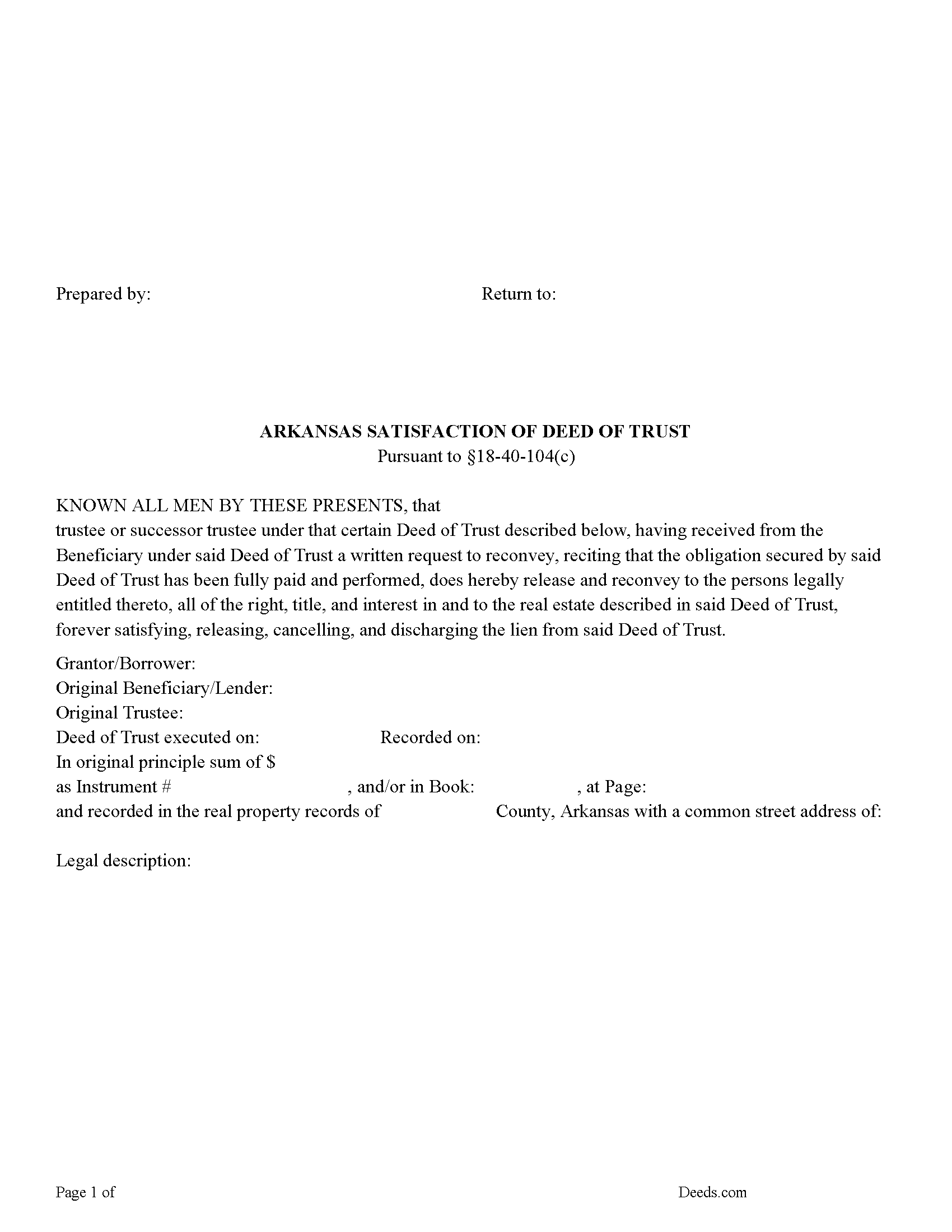
(The trustee of a deed of trust or a person employed by the trustee shall reconvey all or any part of the property encumbered by a deed of trust to the person entitled to the property on written request of the beneficiary of the deed of trust for a reasonable fee plus costs.)(Chapter 40 - Mortgages 18-40-104(c). Acknowledgment of satisfaction on record)
A trustee of a deed of trust shall be any:
(1) Attorney who is an active licensed member of the Bar of the Supreme Court of the State of Arkansas or law firm among whose members includes such an attorney;
(2) Bank or savings and loan association authorized to do business under the laws of Arkansas or those of the United States;
(3) Corporation which is an affiliate of a bank or savings and loan association authorized to do business under the laws of Arkansas or those of the United States, which is either an Arkansas bank or a registered out-of-state bank, as the terms are defined under 23-45-102, which maintains a branch in the State of Arkansas; or
(4) Agency or authority of the State of Arkansas where not otherwise prohibited by law.
(b) (1) The beneficiary may appoint a successor trustee at any time by filing a su... More Information about the Arkansas Satisfaction of Deed of Trust
Assignment of Mortgage or Deed of Trust
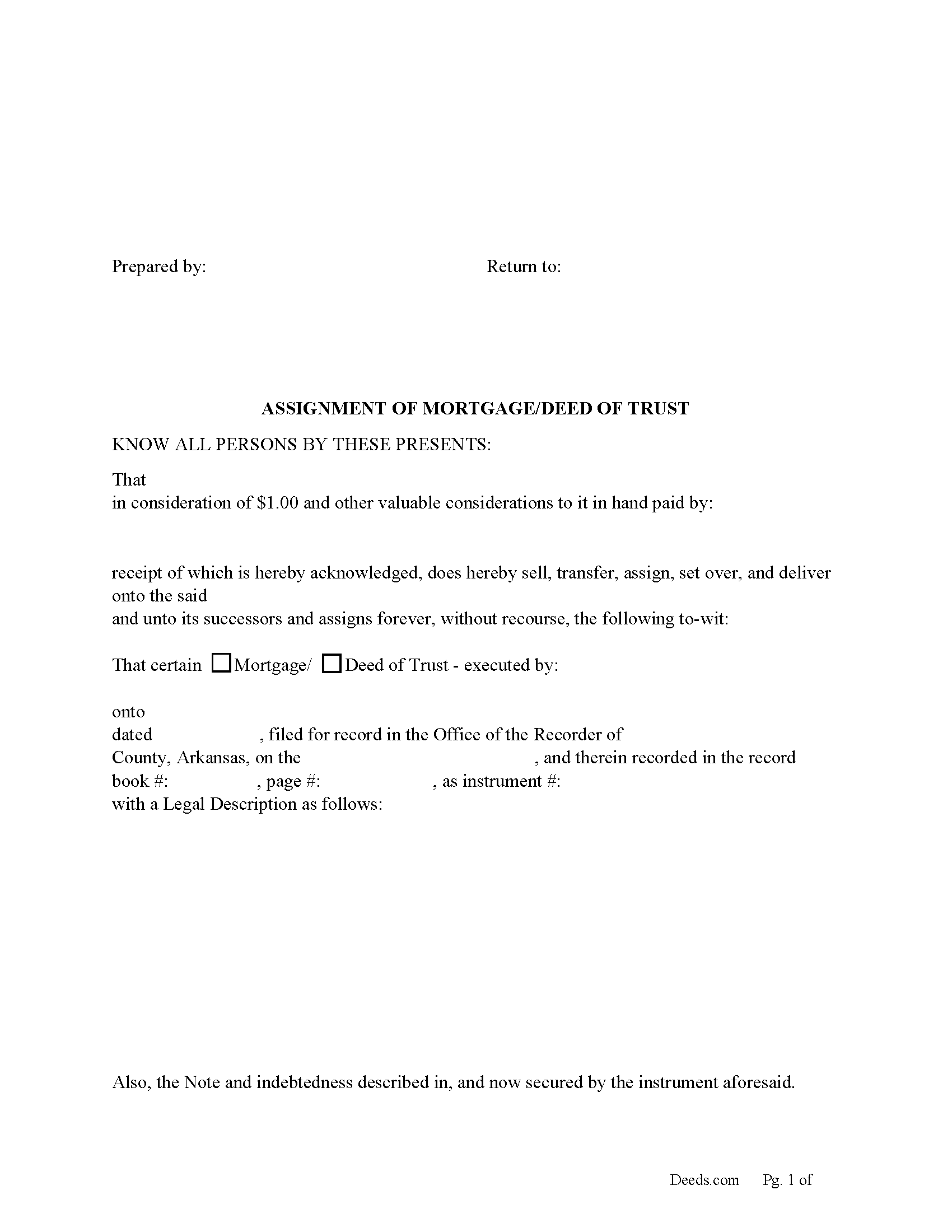
Use these forms to assign/transfer a previously recorded mortgage or deed of trust onto a new party, this is frequently done when a mortgage/deed of trust has been sold.
Notice of Assignment Form Included.
The Truth and lending act requires that borrowers be notified when their Mortgage/Deed of Trust debt has been sold, transferred, or assigned to a new creditor.
Title 18 - Property
Subtitle 4 - Mortgages and Liens
Chapter 40 - Mortgages
18-40-109. Transfer, etc., by separate instrument
(a)
(1) No provision contained in 18-40-103, 18-40-106, 18-40-107, and this section shall prevent any mortgagee, trustee, agent of owner of record, or the owner of record, transferee, or assignee appearing of record, from selling, transferring, or assigning any deed of trust, mortgage, or vendor's lien retained in deed by separate instrument duly acknowledged and recorded.
(2) At the time of recording any separate instrument transferring any mortgage, deed of trust, vendor's lien, or lien retained in deed, note, bond, or other instrument, the clerk and ex officio recorder in the office in which the transfer or assignment shall appear shall note on the margin of the record of the o... More Information about the Arkansas Assignment of Mortgage or Deed of Trust
Substitute of Trustee for Deed of Trust
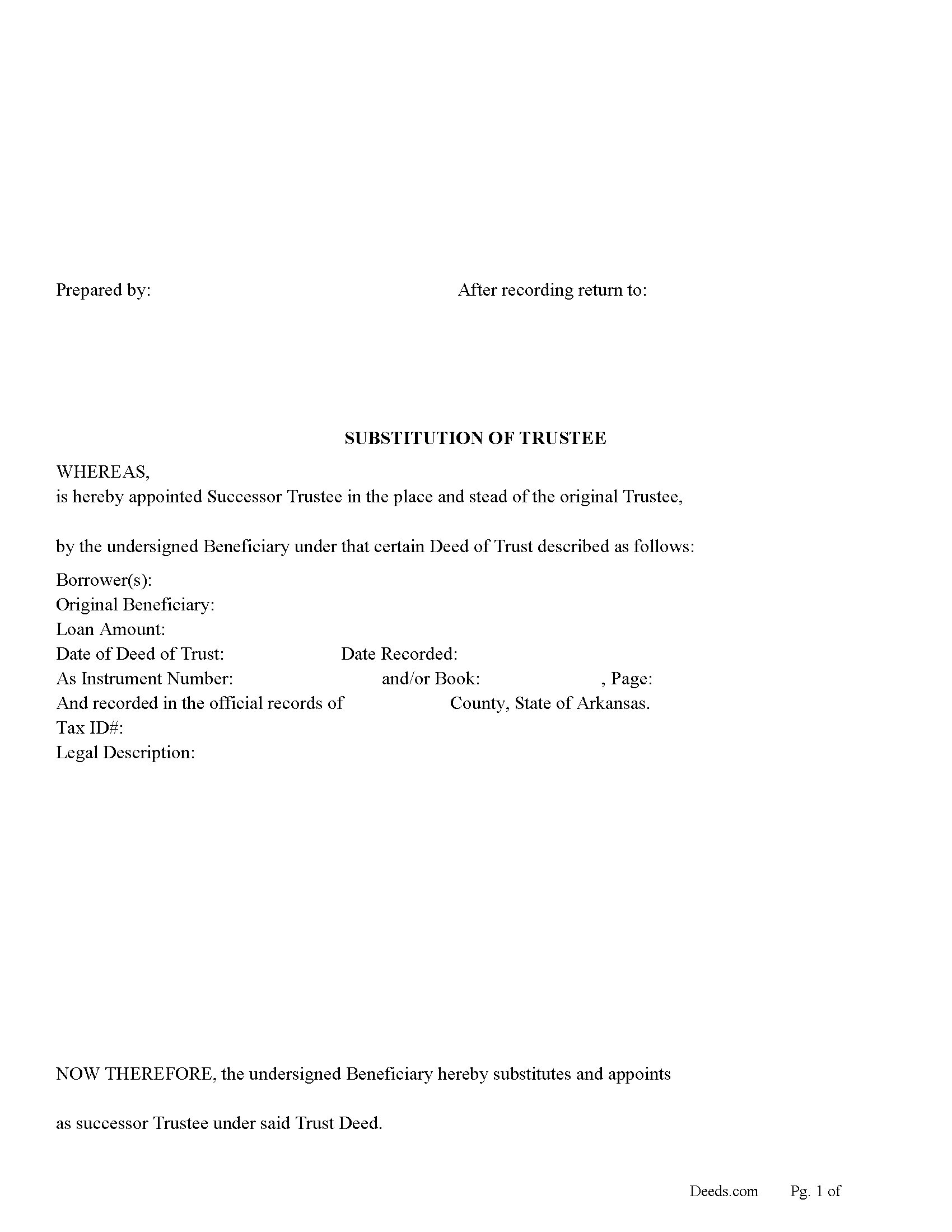
There are many reasons why a Substitute Trustee is needed, some include: original trustee is no longer available or can't act, the lender wants to change the trustee, property needs to foreclosed on and a different trustee is required, etc. This form is used by the current beneficiary/lender to appoint a new trustee for a Deed of Trust.
Arkansas Statutes State:
(b)(1) The beneficiary may appoint a successor trustee at any time by filing a substitution of trustee for record with the recorder of the county in which the trust property is situated.
(2) The new trustee shall succeed to all the power, duties, authority, and title of the original trustee and any previous successor trustee.
(3) The beneficiary may, by express provision in the substitution of a trustee, ratify and confirm actions taken on its behalf by the new trustee prior to the recording of the substitution of the trustee. Ark Statute 18-50-102(b)
(c) The substitution shall identify the deed of trust by stating the names of the original parties thereto, the date of recordation, and the book and page where recorded or the recorder's document number. The substitution shall also state the name of the new trustee an... More Information about the Arkansas Substitute of Trustee for Deed of Trust
Purchasers Agreement (Cash Terms)
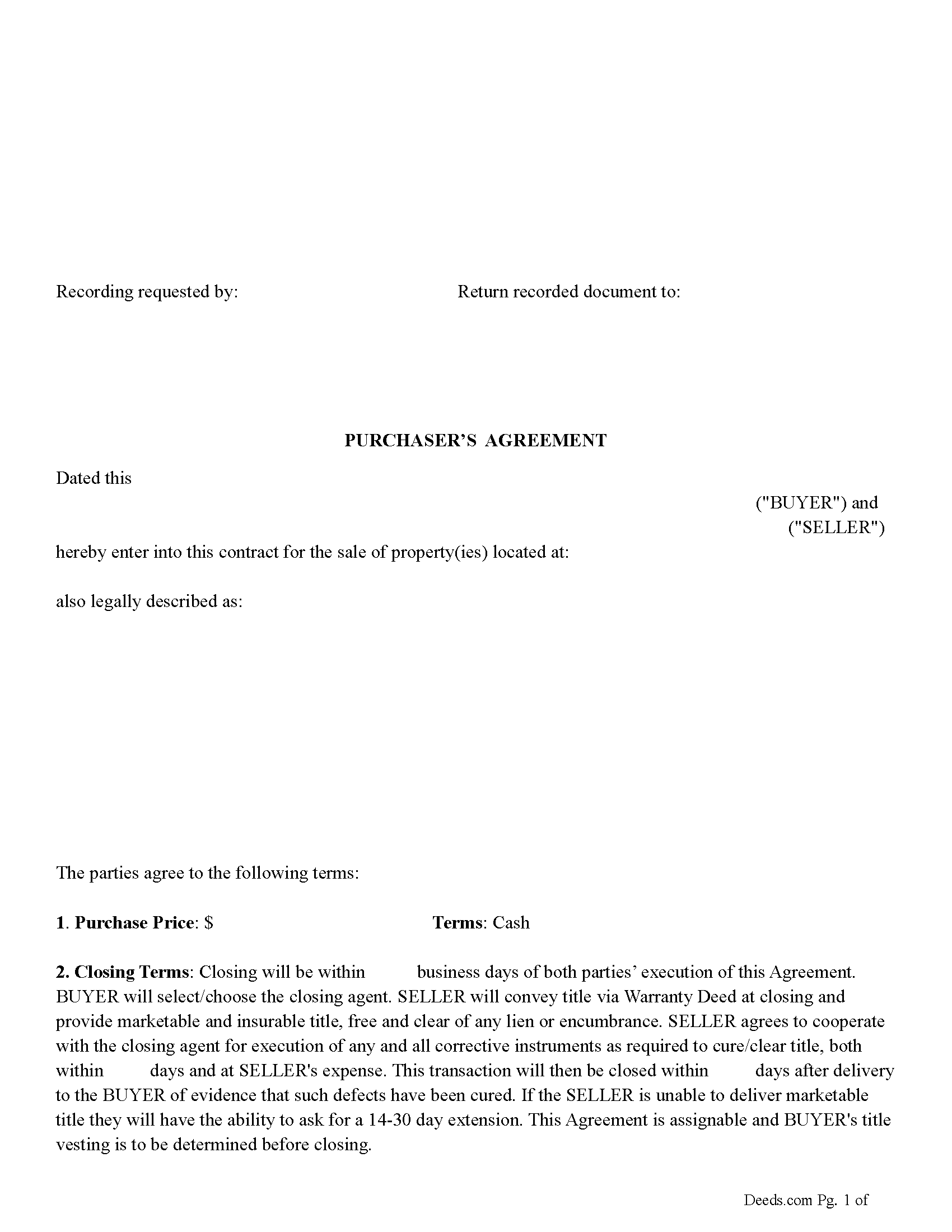
A cash "Purchaser's Agreement" in Arkansas is used in real estate transactions when the buyer intends to pay the entire purchase price with cash rather than financing the purchase through a mortgage or other lending methods. This type of agreement can be used in various scenarios, making it a versatile and often attractive option for both buyers and sellers. Here’s when and why a cash purchaser's agreement might be used:
Examples:
Quick Closings: Cash transactions are typically faster than those involving financing. Without the need to secure mortgage approval, the closing process can be streamlined significantly. This is particularly appealing in competitive real estate markets where a quick close can be a deciding factor for a seller accepting an offer.
Investment Purchases: Investors often prefer cash purchases to simplify acquisitions and avoid the complexities and potential delays of loan approvals. Cash deals also often allow investors to be more competitive with offers, particularly in hot markets or for properties that might not qualify for traditional financing due to condition or other factors.
Estate Sales or Properties in Probate: When a property is being sold... More Information about the Arkansas Purchasers Agreement (Cash Terms)
Purchaser's Agreement (with installment payments)
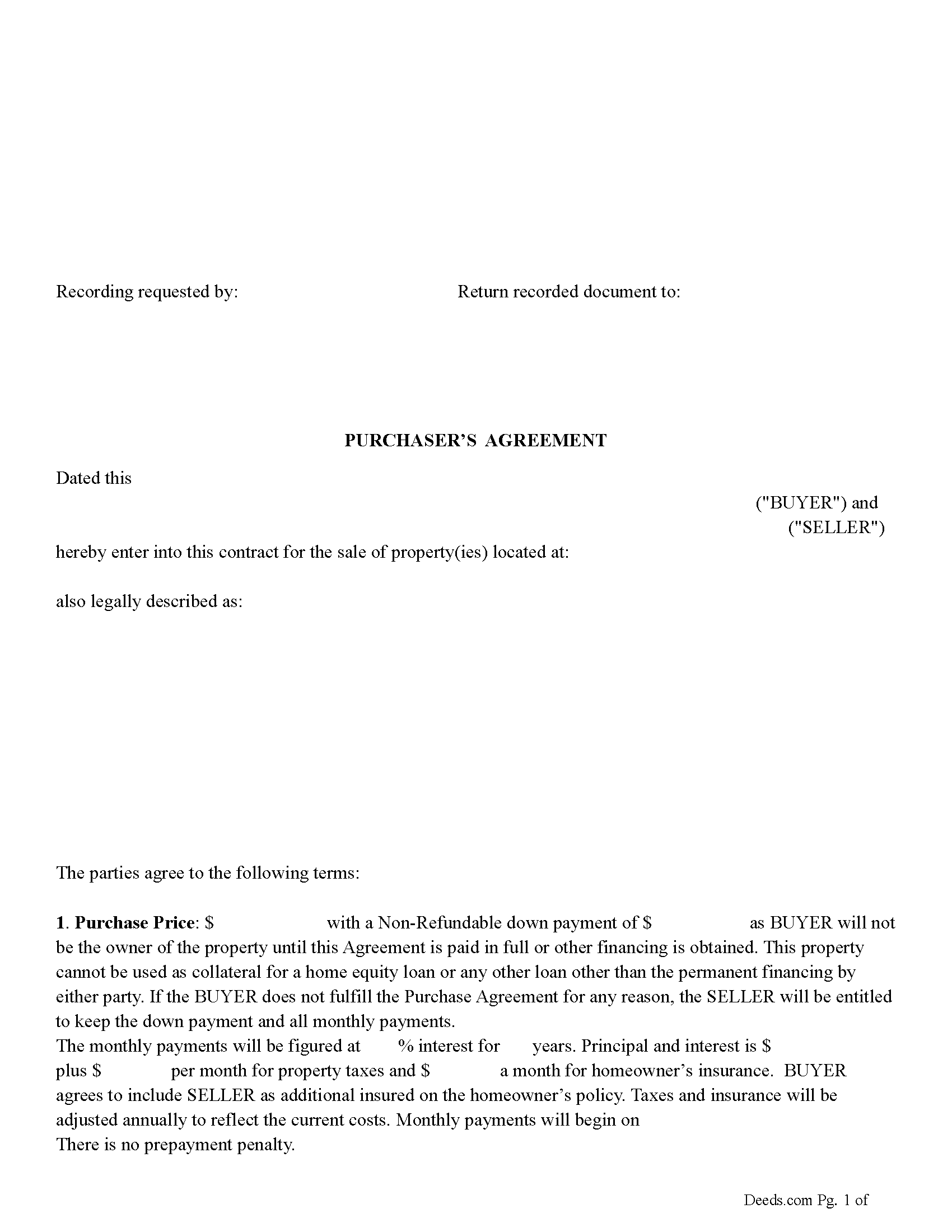
PURCHASER’S AGREEMENT (with installment payments)
In Arkansas, a purchaser’s agreement with payments, often referred to an installment sale agreement, is a common way to structure the sale of real property when the buyer is unable to pay the full purchase price upfront and does not qualify for or seek traditional mortgage financing. Here’s how such agreements typically work and key elements they include:
Overview of a Purchase Agreement with Payments:
1. A purchase agreement with payments in Arkansas allows a buyer to pay for the property in installments directly to the seller over a specified period. This method bypasses the need for immediate traditional financing.
2. Clearly identifies the buyer and the seller.
3. Legal Description of Property.
4. Purchase Price: States the total agreed-upon price for the property.
5. Down Payment: Specifies any down payment required by the buyer at the outset of the agreement.
6. Payment Schedule: Details the amount of each installment, when payments are due (e.g., monthly), and the duration over which payments will be made. It also specifies the form of payment.
7. Interest Rate: If applicable, the interest rate on the unpaid ba... More Information about the Arkansas Purchaser's Agreement (with installment payments)
Memorandum and Notice of Agreement
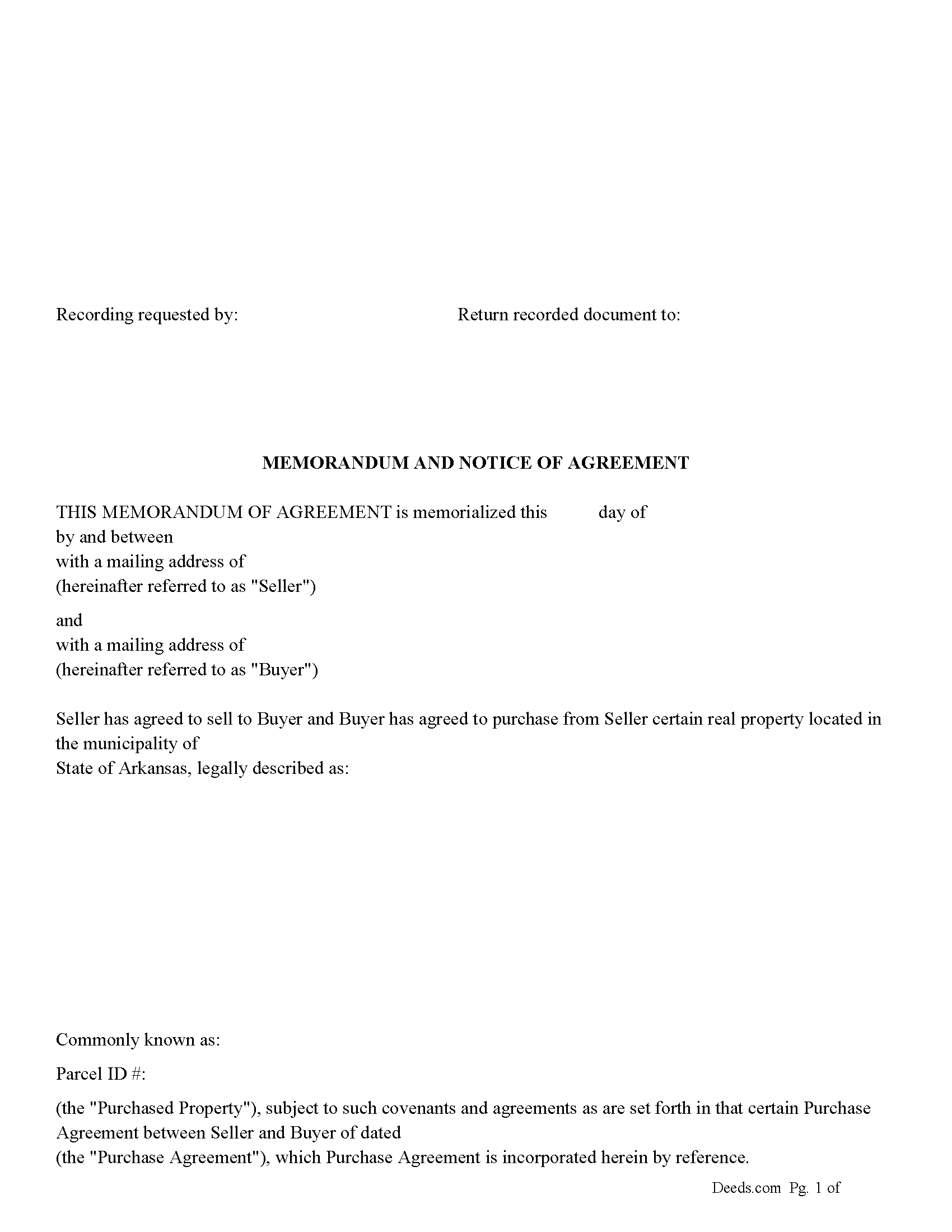
A "Memorandum of Purchase Agreement" commonly referred to as a "Memorandum of Agreement" (MOA), Memorandum of Contract (MOC) or "Memorandum of Understanding" (MOU) in the context of real estate, is used primarily as a means to provide public notice of an equitable interest in a real estate transaction without disclosing the full details of the purchase agreement. This document is particularly useful in transactions where the buyer and seller have agreed to terms but the final closing and transfer of the deed have not yet occurred. By recording this memorandum with the county recorder's office, the buyer establishes a public record of their interest in the property, which can protect against subsequent claims or liens by third parties.
Key Purposes of a Memorandum of Purchase Agreement:
1. Notice of Equitable Interest: The memorandum serves as notice to the public that the buyer has an equitable interest in the property due to the purchase agreement. This is important in protecting the buyer’s interest against claims by other parties who might otherwise be unaware of the agreement.
2. Protection During the Closing Process: Real estate transactions can involve a lengthy clo... More Information about the Arkansas Memorandum and Notice of Agreement
Easement Deed
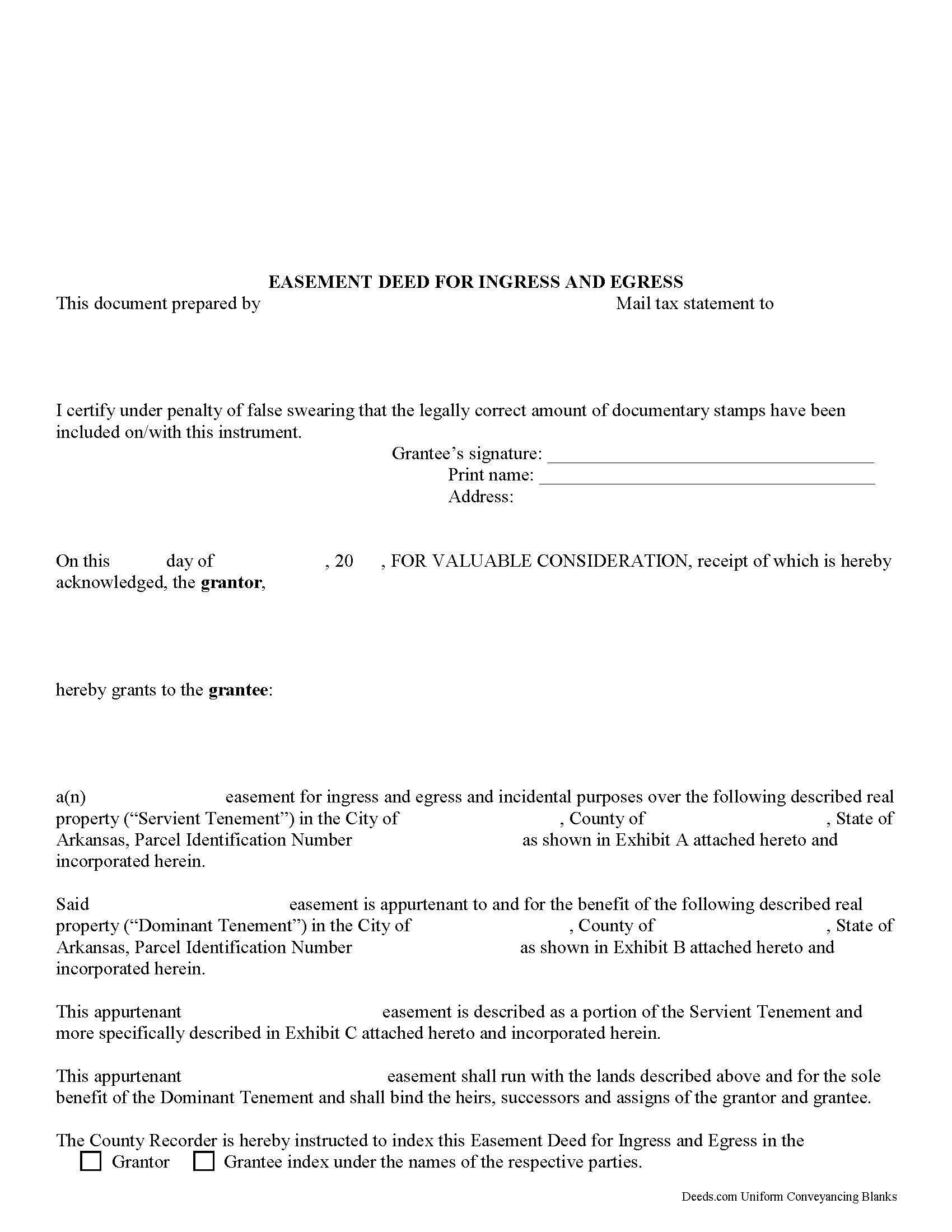
An easement deed is a voluntary transfer of some of the rights inherent in property ownership. It allows the easement holder to use real property in Arkansas that he or she does not own or possess, but does not allow the holder to occupy the land or exclude others from using it, unless their use would interfere with the easement holder's use.
An easement in Arkansas, whether it is a preservation easement, conservation, easement by prescription, or any other kind in use, must contain binding and enforceable covenants that run with the land or structure.
Before an easement or any deed affecting real property can be recorded, it must be acknowledged or proved as required by law. Easement deeds and all other instruments of writing for the conveyance of real estate in Arkansas should be executed in the presence of two witnesses who are not otherwise involved with the transaction or should be acknowledged by the grantor in the presence of two such witnesses, who should then subscribe the deed. When the witnesses do not subscribe the easement as described at the time of execution, the date of their subscribing it should be stated with their signatures ( 18-12-104). Any court or o... More Information about the Arkansas Easement Deed
Termination, Cancellation of Easement / Right of Way
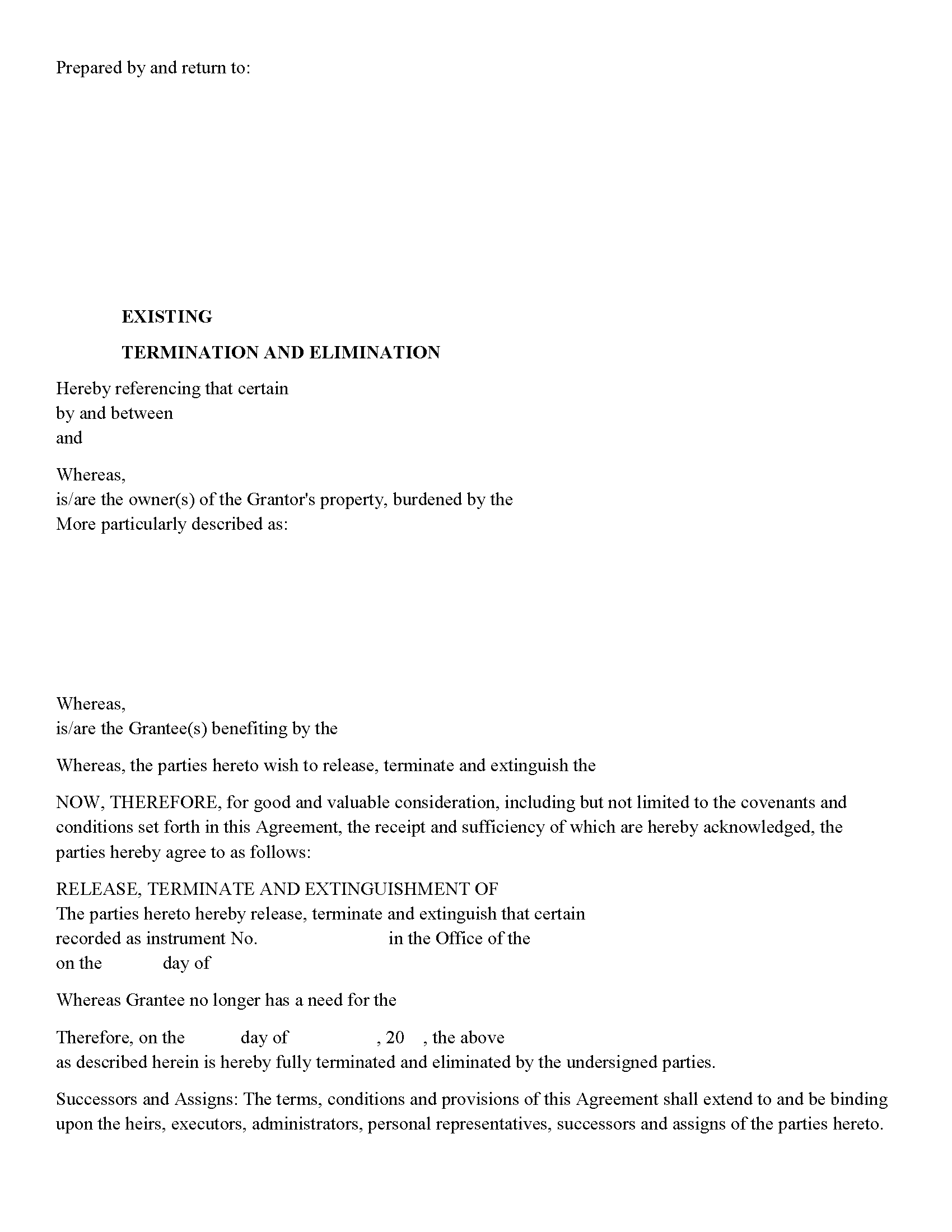
Use this form to release, terminate, extinguish a previously recorded document that involves access to and from a property.
Documents such as:
1. Easement Deeds or Agreements (An easement is a non-possessory interest in land, granting the right to use someone else's property for a specific purpose, like a driveway or utility line)
2. Access Roads
3. Right of Ways
4. Utility Easements (Power, Gas, Water, Sewer, Etc.)
5. Drainage Easements
This document allows the owner of the land, burdened by the access and the party that benefits from the access, to sign an agreement releasing the property from such access, ... More Information about the Arkansas Termination, Cancellation of Easement / Right of Way
Personal Representative Deed
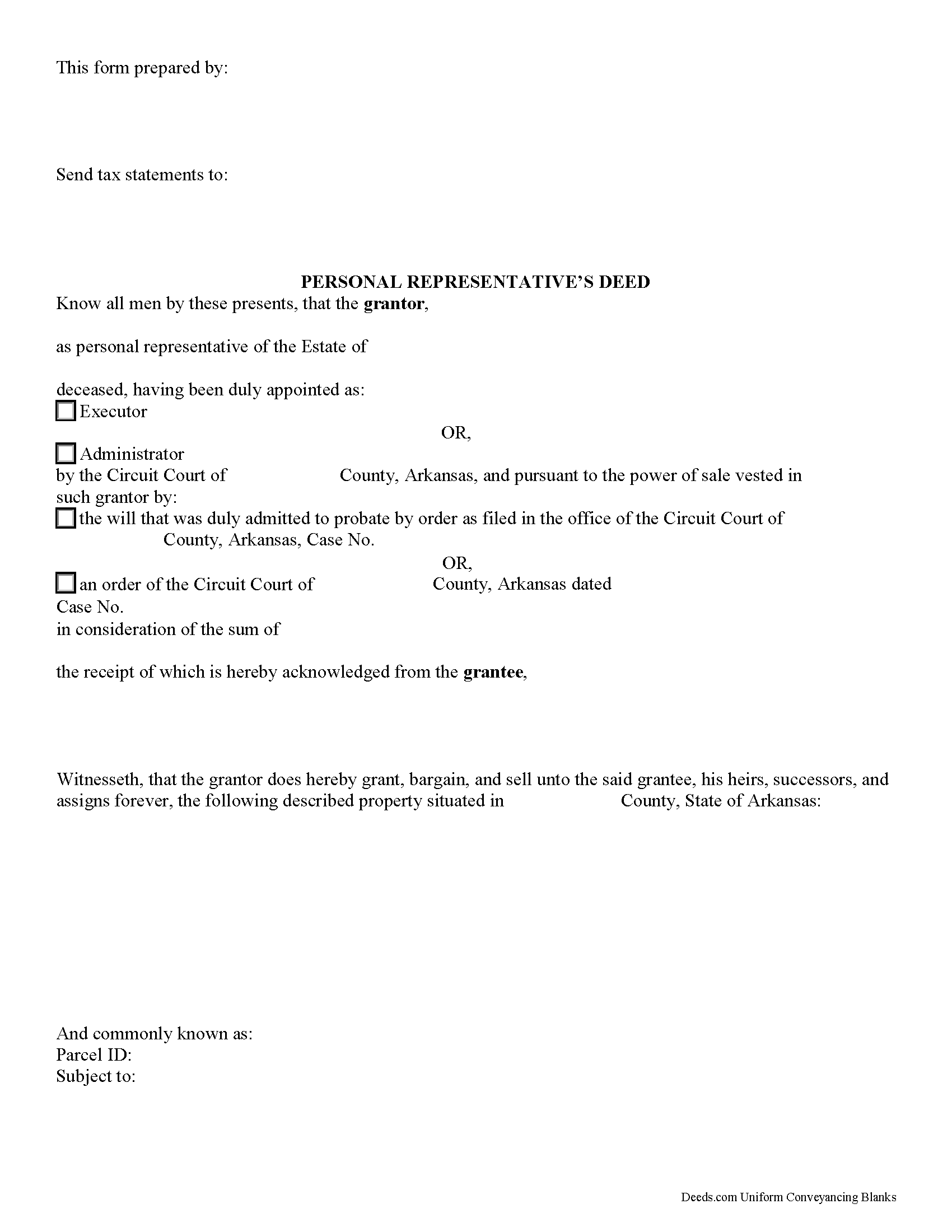
In Arkansas, the individual who oversees a decedent's estate is called a personal representative. This title is used interchangeably with the terms executor or administrator. One common function of the personal representative is transferring title to real property, as directed by the decedent's will or the circuit court. The document used in these cases is a personal representative's deed.
Personal representative's deeds in Arkansas "do not warrant title to a subsequent grantee, and any subsequent grantee may not assert or claim any warranty of title deriving from" them, though a grantor may customize the deed to include a title warranty through "express use of warranty language" ( 15-12-605).
Consult an attorney with questions regarding probate administration and personal representative's deeds in Arkansas.
(Arkansas Personal Representative Deed Package includes form, guidelines, and completed example)... More Information about the Arkansas Personal Representative Deed
Beneficiary Deed
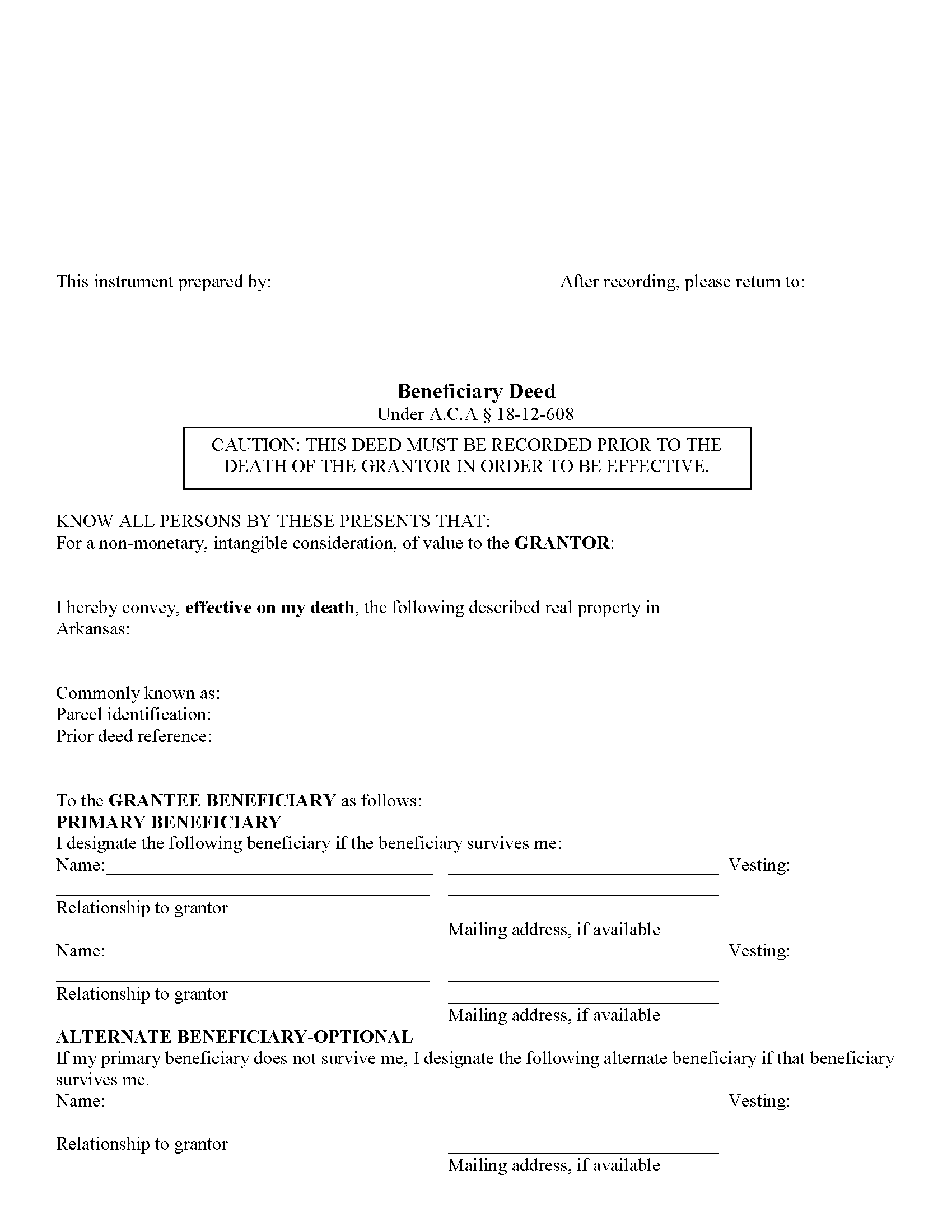
Beneficiary deeds in Arkansas are governed by A.S.A. 18-12-608. This statute offers owners of Arkansas real property to designate one or more beneficiaries who may gain the interest that remains in the owner's name at the time of his/her death.
Even though beneficiary deeds, just like other deeds of conveyance, must be lawfully recorded after they are completed and executed (signed in front of a notary), they differ from standard deeds in some important ways. If they are not recorded during the owner's life, they have no effect. Beneficiary deeds do not transfer any present interest in the real estate, so there is no requirement for consideration.
Perhaps one of their most unique features is the fact that the owner may execute and record new beneficiary deeds that change the beneficiary, the terms of the transfer, or even revoke the whole thing. The owner may even sell the property to someone else, leaving no interest to convey at death. Again, like the beneficiary deeds, to be effective, any changes must be recorded while the owner is alive. This flexibility allows land owners to retain absolute control over and use of the property.
When the owner dies, the benefici... More Information about the Arkansas Beneficiary Deed
Beneficiary Deed Revocation
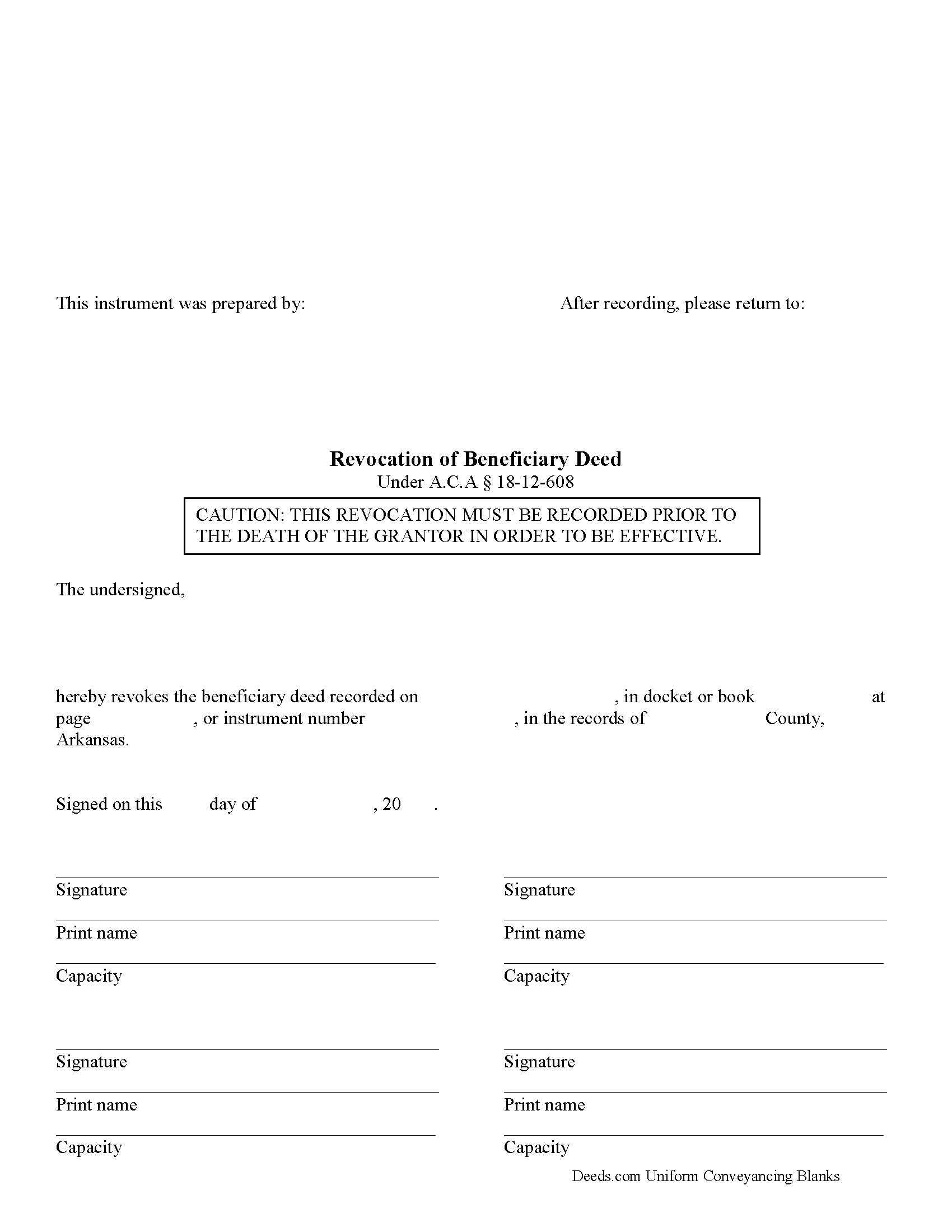
Revoking a Beneficiary Deed in Arkansas
Beneficiary deeds in Arkansas are governed by A.S.A. 18-12-608. This statute also includes information about revoking an executed and recorded beneficiary deed.
Section 18-12-608 (d)(1) states that a beneficiary deed "may be revoked at any time by the owner or, if there is more than one (1) owner, by any of the owners who executed the beneficiary deed." Why is this flexibility important? Well, life is uncertain and circumstances change. The original beneficiary may no longer be an appropriate recipient of the real property. Perhaps the beneficiary knows about the transfer, but is unable or unwilling to accept it. Instead of disclaiming the gift when the owner dies, thus forcing the property back into the estate for probate, the owner has the option to revoke the beneficiary deed and designate someone else to receive it.
Regardless of the reason, to revoke a beneficiary deed, the owner must execute a document setting forth the revocation and then record it, DURING HIS/HER LIFE, in the county where the property is situated. This should be the same county where the beneficiary deed was recorded earlier.
The owner may also simply s... More Information about the Arkansas Beneficiary Deed Revocation
Disclaimer of Interest
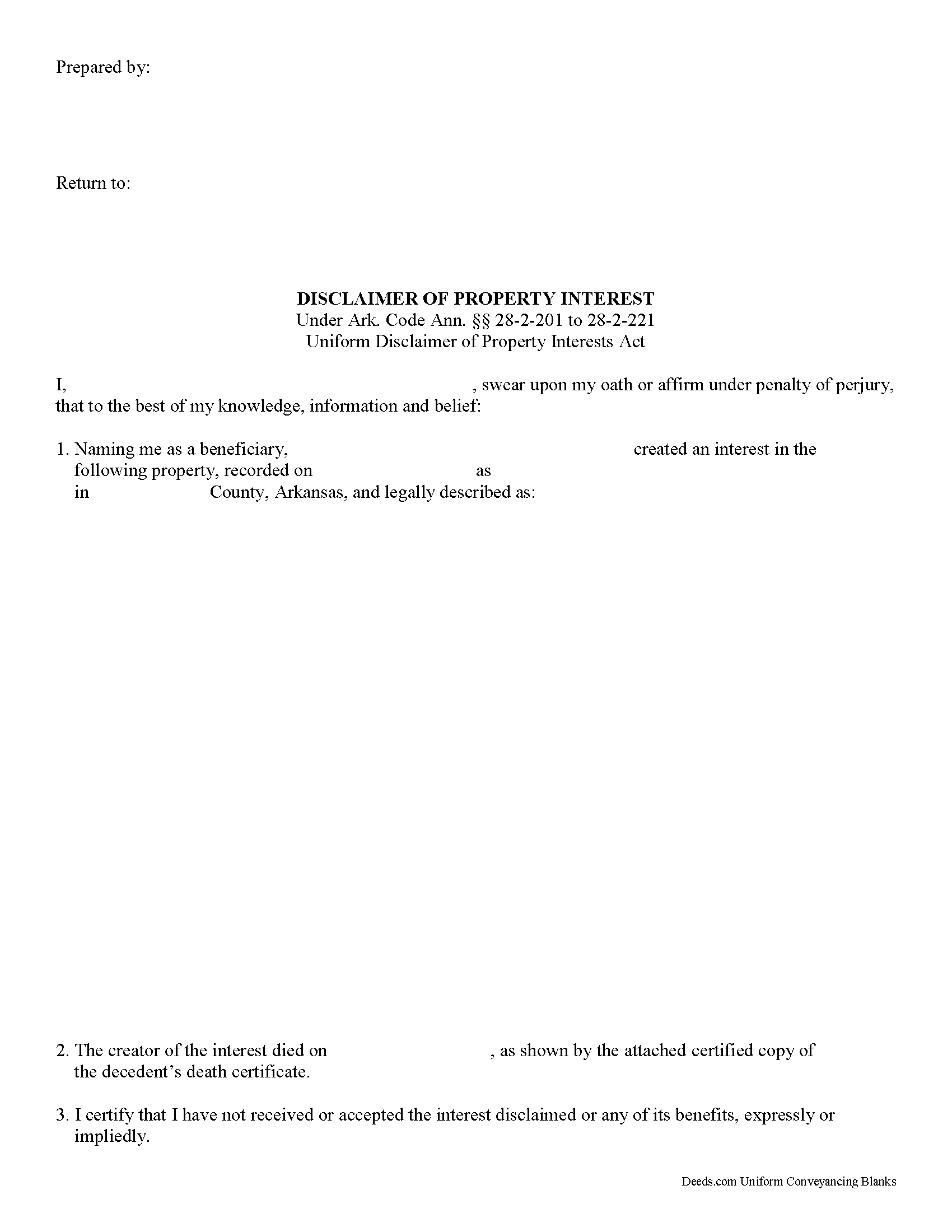
Under the Arkansas statutes, the beneficiary of an interest in property may renounce the gift, either in part or in full (Ark. Code Ann. 28-2-201 to 28-2-221 Uniform Disclaimer of Property Interests Act). Note that the option to disclaim is only available to beneficiaries who have not acted in any way to indicate acceptance or ownership of the interest.
The disclaimer must be in writing and include a description of the interest, a declaration of intent to disclaim all or a defined portion of the interest, and be signed by the disclaimant (Ark. Code Ann. 28-2-205 (c)).
Deliver the disclaimer within nine months of the transfer (e.g., the death of the creator of the interest) to the personal representative of the decedent's estate, or file it with a court having jurisdiction to appoint such a representative (Ark. Code Ann. 28-2-212 (c)). In the case of real property, record a copy of the disclaimer in the office of the circuit clerk of the county in which the property or interest disclaimed is located (Ark. Code Ann. 28-2-215 (a)).
A disclaimer is irrevocable and binding for the disclaiming party and his or her creditors (Ark. Code Ann. 28-2-205 (e)), so be sure to ... More Information about the Arkansas Disclaimer of Interest
Notice to Owner
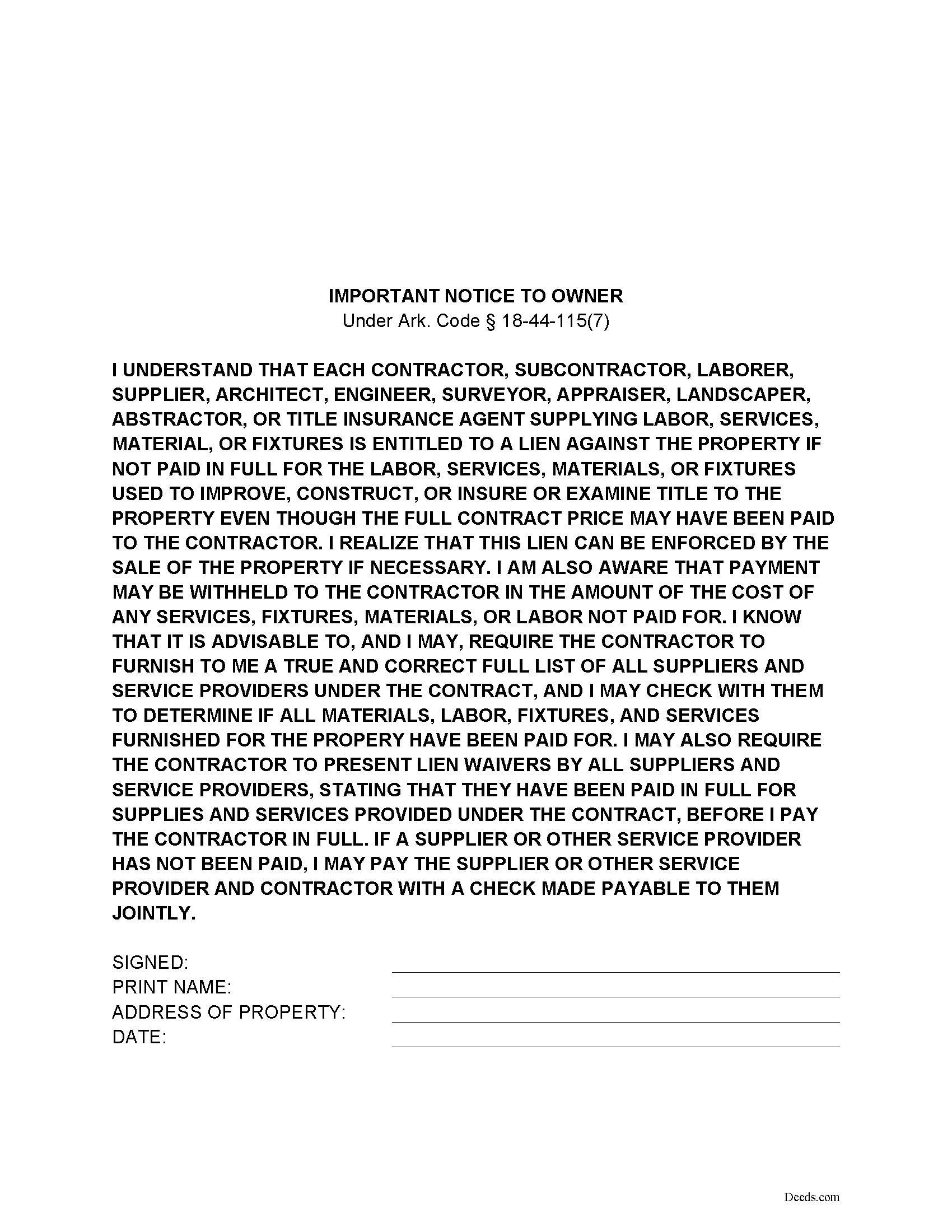
The Notice to Owner by Claimant under Ark. Code Sec. 18-44-115 is a preliminary notice that must be delivered to the owner prior to commencing construction under a contract.
The notice states that contractors, subcontractors, suppliers, and other parties supplying labor, services, materials, or fixtures for the improvement of real property under a contract with the owner are entitled to a lien against the property if not paid in full for their services. It also states that the owner is entitled to ask the contractor for a list of all suppliers and service providers under the contract, the receipt of which allows the owner to determine that all materials, labor, fixtures, and services have been paid for. Without delivering this notice, a potential claimant forfeits its right to file a lien against the property.
Typically, this notice is made part of the contract. However, when the owner does not reside in the same county or state as the property under contract, the claimant can record the notice in the property records of the circuit court clerk's office where the subject property is located (Ark. Code Sec. 18-44-116).
The document should contain the address of the propert... More Information about the Arkansas Notice to Owner
Notice of Intent to File
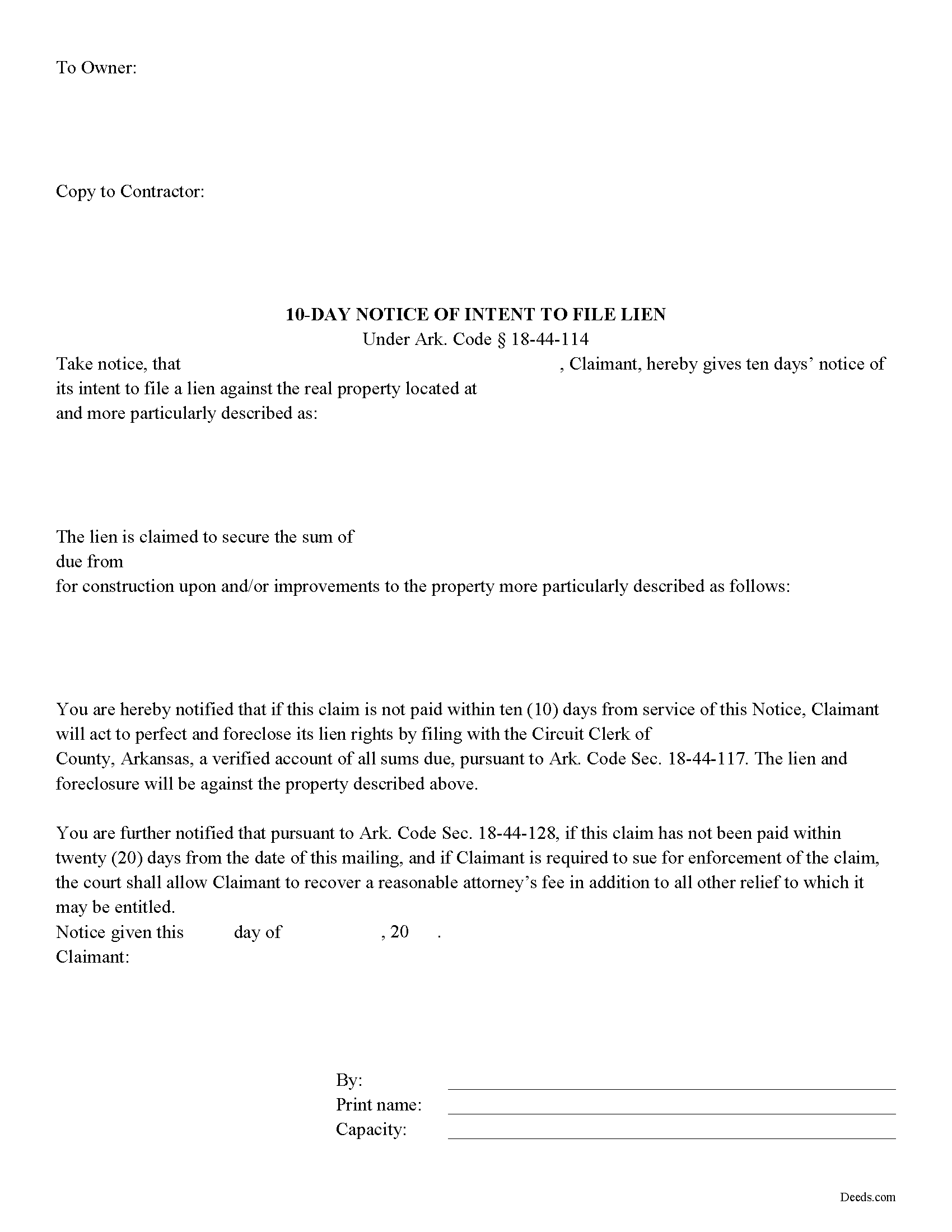
The Arkansas 10 days' notice of intent to file lien under Ark Code Sec. 18-44-114 is a preliminary notice required from a potential claimant before filing a claim of lien against a property. A claim of lien is unenforceable if the claimant fails to abide notice requirements as directed by law.
The notice, delivered to the owner, states the balance owed on an underlying contract. If the balance is not paid within ten days' receipt of the notice, the claimant has a claim on the property and may proceed to file a claim of lien against the title.
Arkansas law stipulates what constitutes "delivery." Notice may be served by an officer authorized to serve process in a civil action; a person who would be a competent witness; by mail addressed to the person to be served, with restricted delivery and return receipt requested; or by any means that provides written, third-party verification of delivery to anywhere the owner maintains residence or an office or conducts business (18-44-114). When served by persons other than an officer, an affidavit of service of notice is also required. When served by mail, the verification of service is a return receipt signed by the addressee or a retur... More Information about the Arkansas Notice of Intent to File
Affidavit of Service
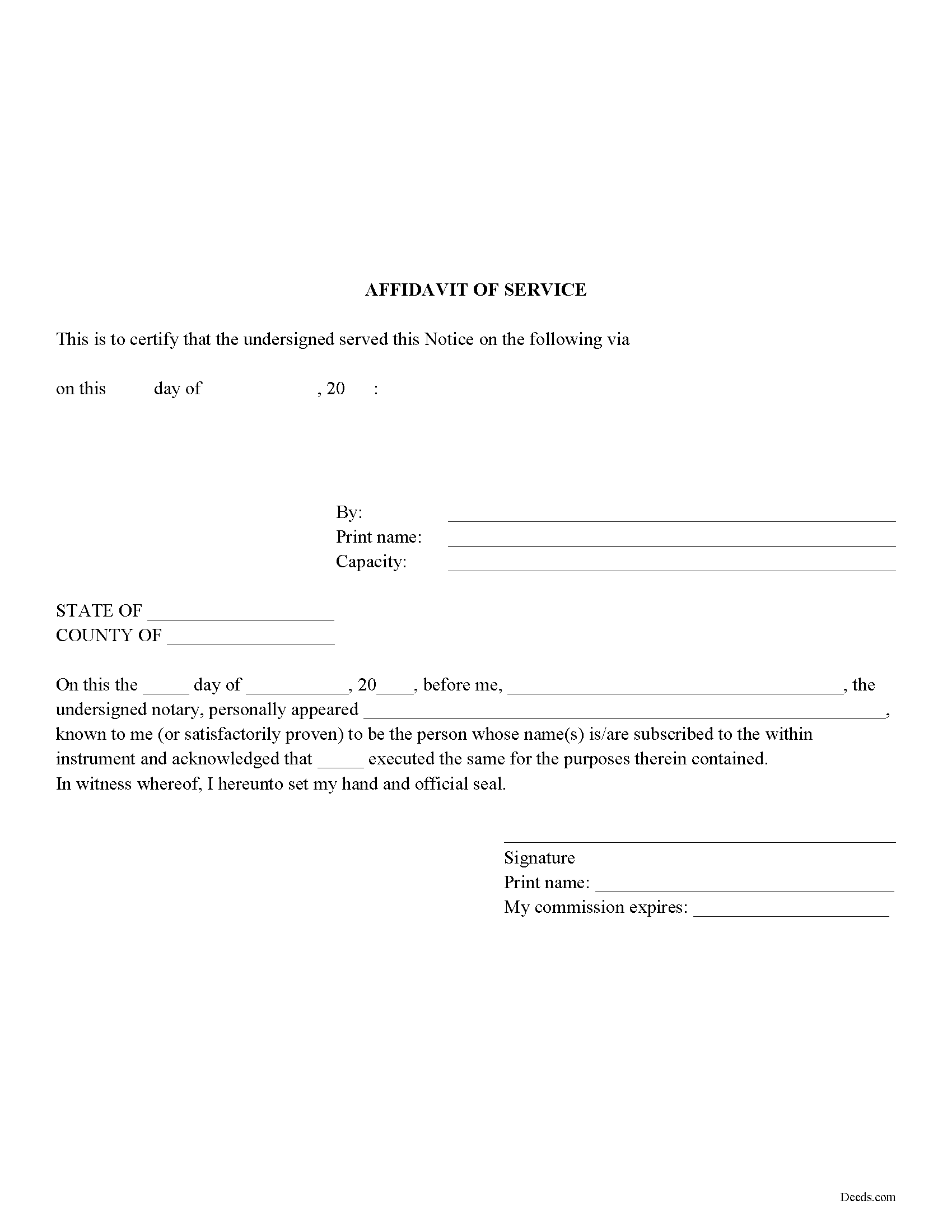
Use an affidavit of service where required to prove service of a notice on the owner of real property. It verifies that the notice was served by someone other than an officer authorized to serve process in civil action.
The affidavit, executed by the person serving notice, cites the date and manner by which notice has been served. It is signed by the individual serving notice in the presence of a notary public. The affidavit may need to be in recordable form if accompanying recorded notices. In this case, the document should meet all state and local recording requirements before submitting in the appropriate circuit clerk's office.
Consult a lawyer to verify whether an affidavit of notice is necessary for the specific circumstances.... More Information about the Arkansas Affidavit of Service
Claim of Mechanics Lien
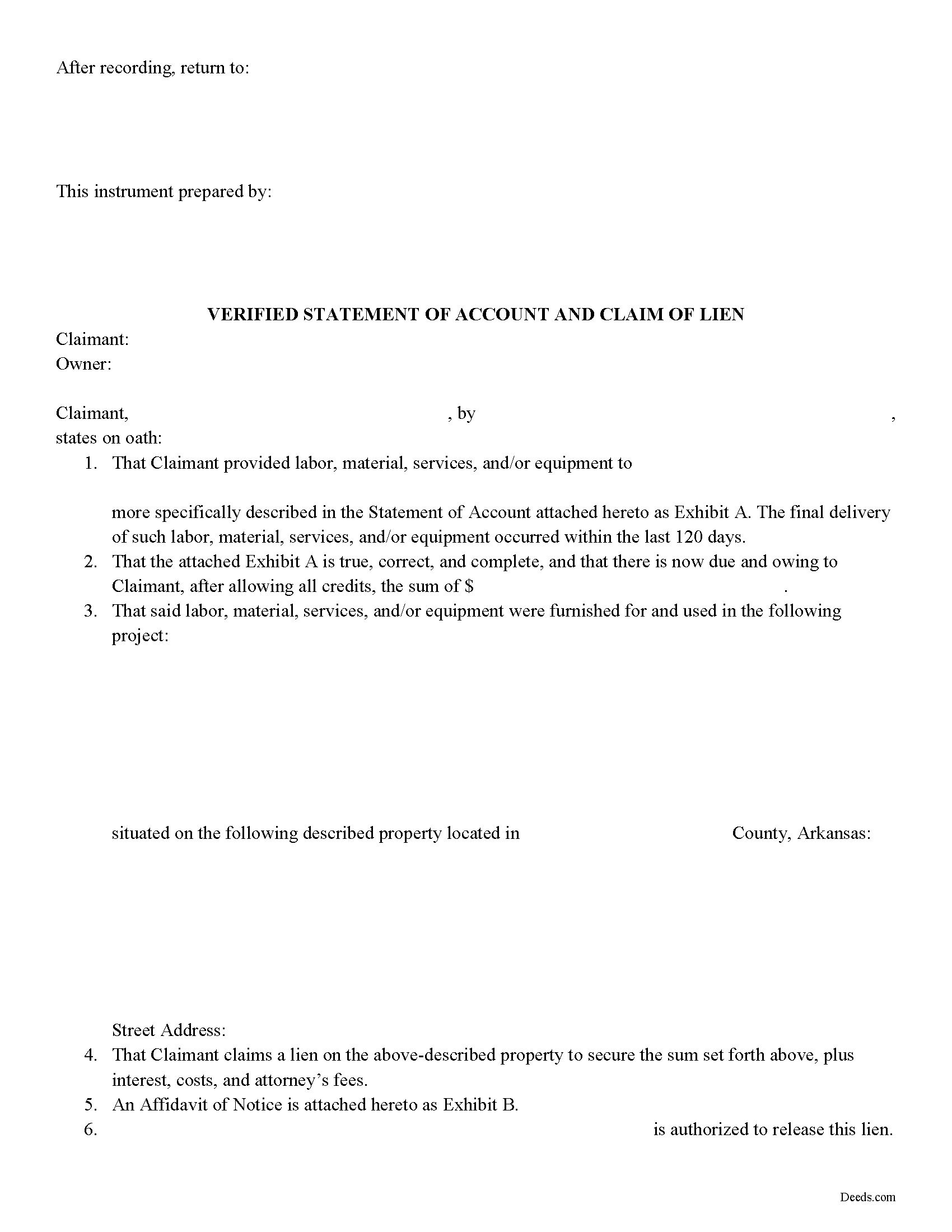
Arkansas Verified Statement of Account and Claim of Lien
A claimant may file a lien against a residential property to secure the amount owed on a contract. Contractors, subcontractors, or suppliers providing labor, services, material, or equipment for improvements of a property under a contract with an owner, proprietor, contractor, or subcontractor are eligible to file mechanic's liens in the State of Arkansas (18-44-101(a)). Claimants have 120 days after the final furnishing of labor, materials, services, or equipment in which to file a lien (18-44-117(a)(1))).
To assert a lien against a property's title, the claimant must execute and record a statement of account and claim of lien in the circuit court clerk's office of the county where the property subject to the lien is located.
The claim of lien is a legal document composed of two parts -- the verified statement of account and lien and an affidavit of notice. The actual lien portion of the document has two requirements by law: a correct description of the property subject to the lien, and an account of the amount owed to the claimant after allowing all credits (18-44-117(a)(1)(B)). The affidavit of notice includes a ... More Information about the Arkansas Claim of Mechanics Lien
Waiver of Mechanic Lien
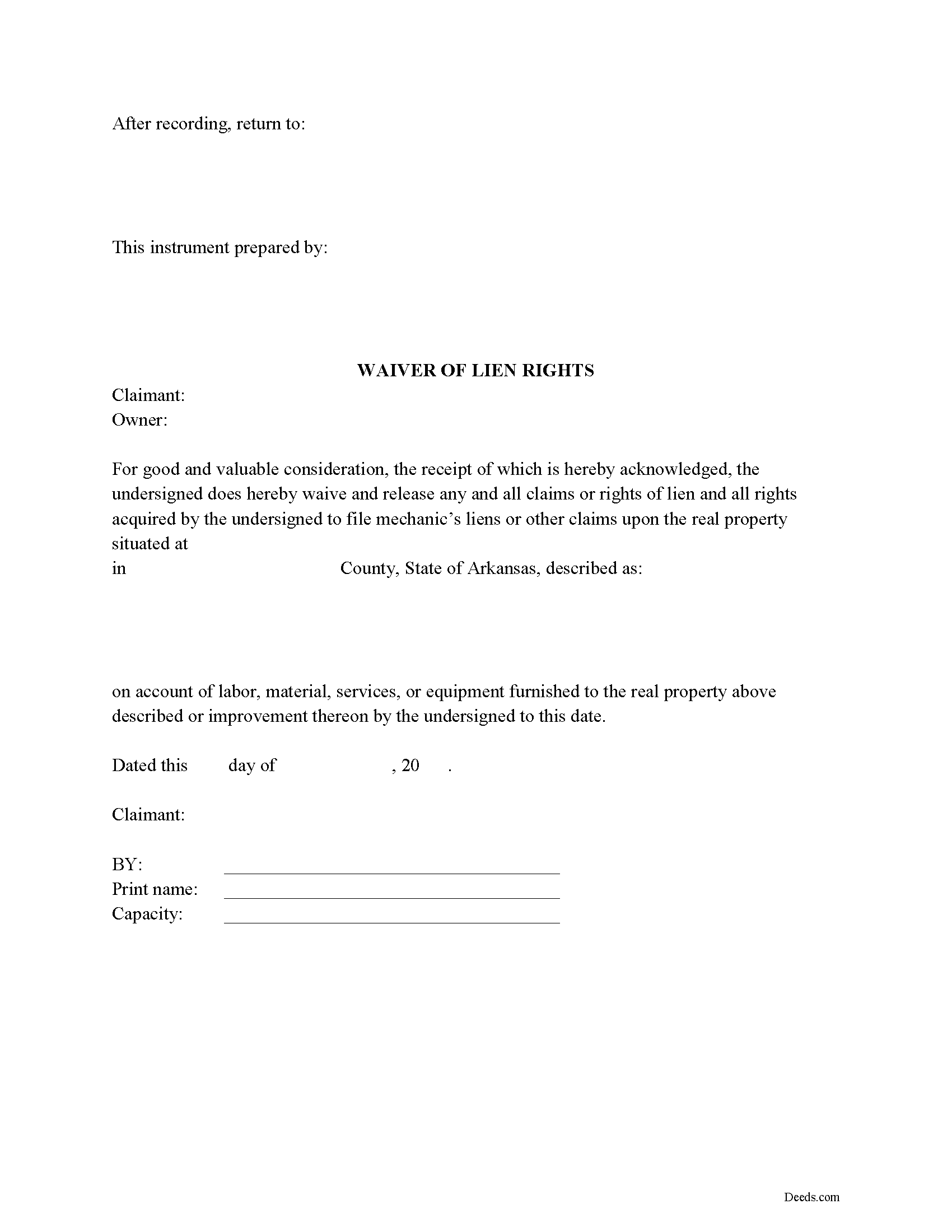
Arkansas provides no statutory direction for waiving rights of lien; however, it is customary for a claimant (contractor) to record a waiver of lien or partial waiver of lien as evidence of receipt of payment.
Lien waivers act as a sort of receipt, stating that a payment or arrangement for payment has been made by the owner for the potential lien claimant's furnishing of labor, materials, services, or equipment on an underlying contract. Waivers do not release the claimant's future rights to lien for labor, materials, services, or equipment furnished after the date the waiver is signed by the claimant.
A typical waiver of lien rights states contains a description of the subject property and the property's address. It identifies the claimant as the executing party and names the title owner of the property with whom the claimant has contracted. Most importantly, it contains a date up to which the claimant is waiving his right to lien (the execution date).
The waiver is signed by the contractor or individual acting on behalf of the contractor. The waiver does not have to be notarized for it to be valid. Waivers are recorded in the circuit court clerk's office in the county wh... More Information about the Arkansas Waiver of Mechanic Lien
Release of Mechanic Lien
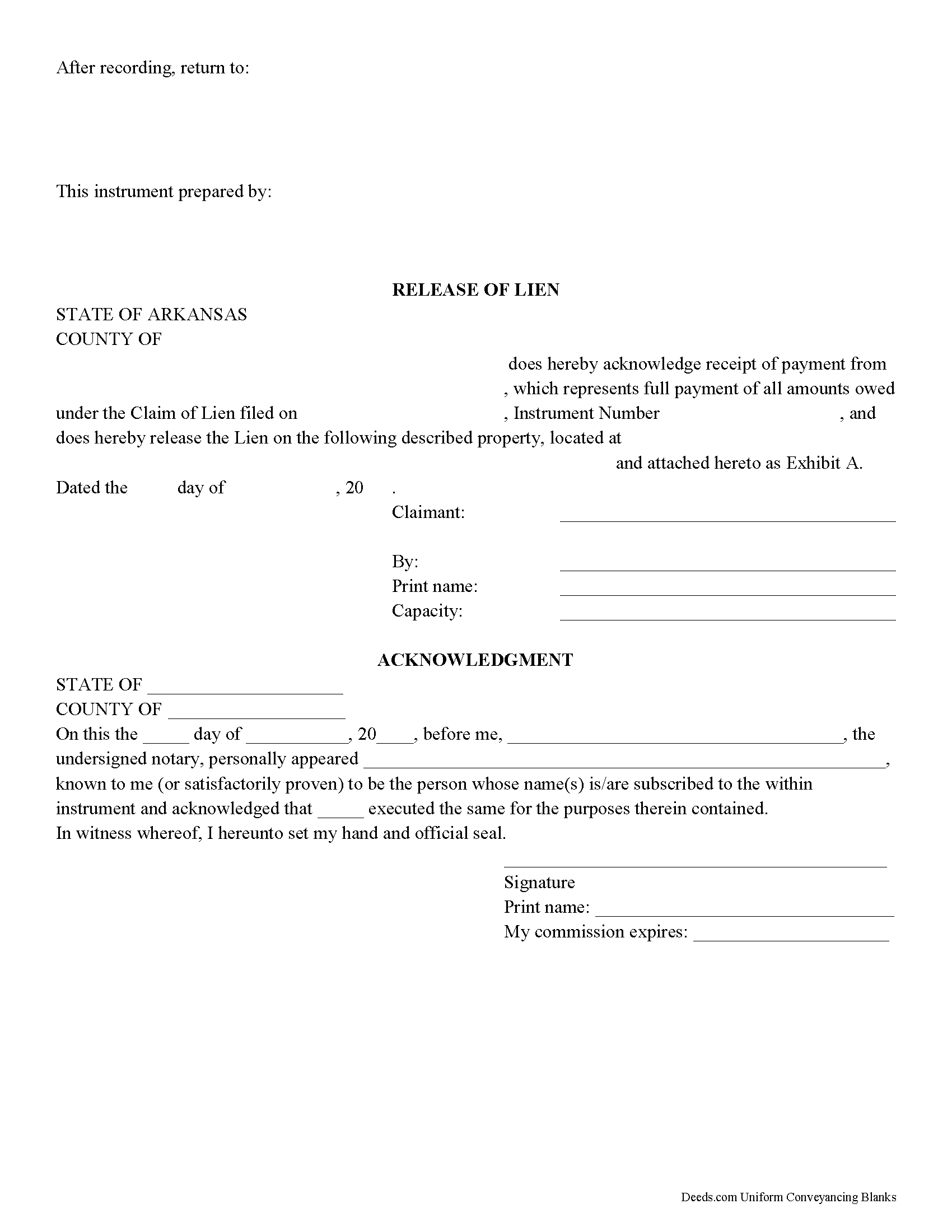
When debt secured by a mechanic's lien is paid by a property owner, the claimant is required to enter a satisfaction or release of lien in the office of the clerk of court within 10 days' receipt of payment pursuant to Ark. Code Sec. 18-44-131.
Arkansas does not have a statutory form for release of lien. Even so, entering a release into the public records provides an end point for the recorded lien. This helps to preserve a clear chain of title, which is important for future transactions involving the property.
The release of lien document should contain enough information to clear the encumbrance of the claim of lien from the property title. The release names the property owner and the claimant releasing the lien, and references the claim by instrument number and date of filing. Because the instrument affects real property, a legal description of the parcel is recommended so that the property may be identified correctly.
The lien claimant must sign the release in the presence of a notary public before recording the document in the circuit clerk's office where the property is located. Documents submitted for recording must meet Arkansas's standardized form, the requirement... More Information about the Arkansas Release of Mechanic Lien
Lis Pendens

What is an Arkansas Lis Pendens?
A Lis Pendens is notification of a pending suit. This notifies potential buyers that the property is under pending litigation and that they would be subject to the outcome of said litigation if they purchased the property. This in effect puts a cloud on the title. [ It shall be necessary for the plaintiff or any one (1) of the plaintiffs, if there is more than one (1) plaintiff, or his or her attorney or agent to file a notice of the pendency of the suit, for record with the recorder of deeds of the county in which the property to be affected by the constructive notice is situated. 16-59-101]
An Arkansas Lis Pendens must contain:
Title of the Cause of the case
General Object of the case
Full description of the property involved
Names of Parties to the suit
Style of the Court where suit is pending
(Arkansas Lis Pendens Package includes form, guidelines, and completed example)... More Information about the Arkansas Lis Pendens
Lis Pendens Release
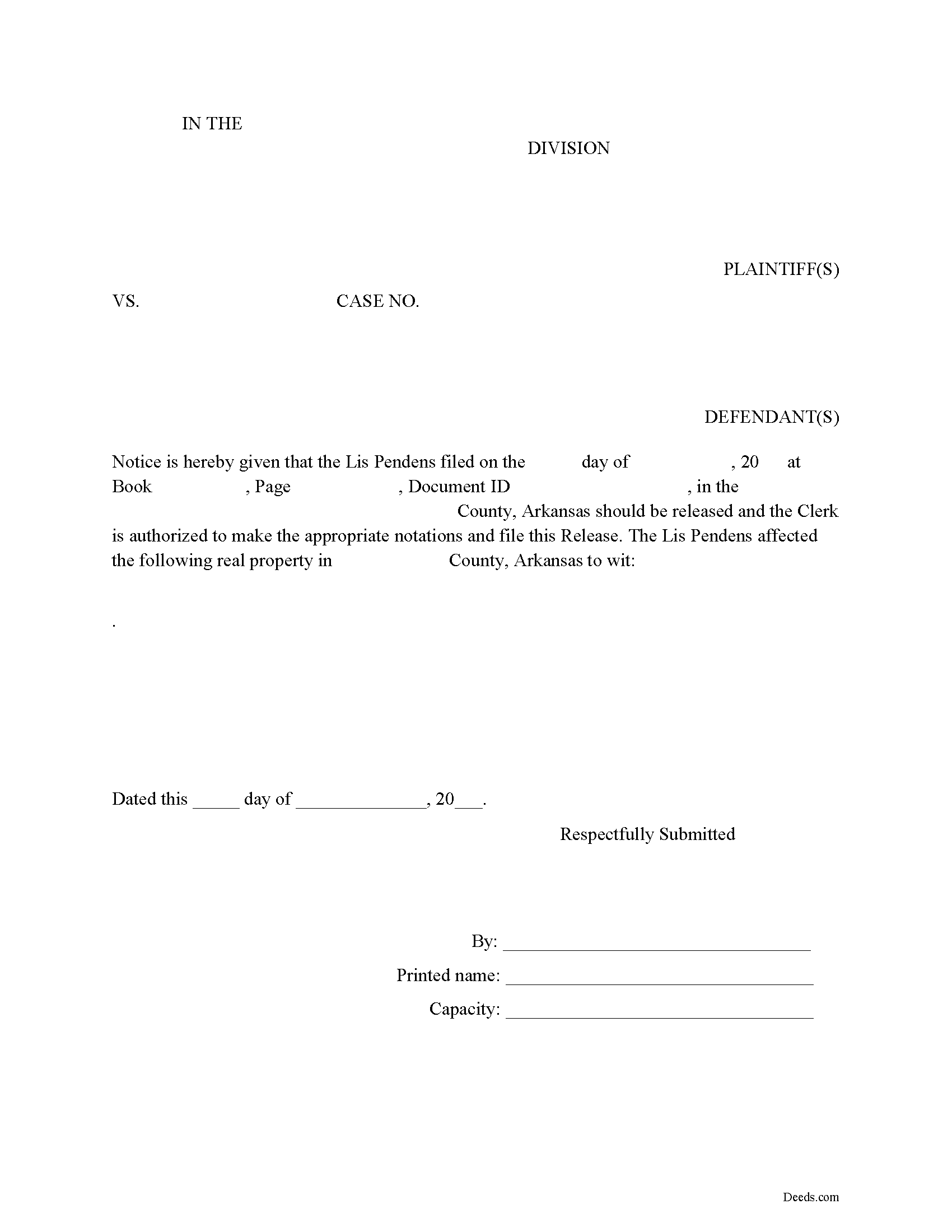
A Release of Lis Pendens instructs the Clerk to release said Lis Pendens. This is important once a suit is finalized or resolved. Generally, the plaintiff or plaintiff's representative (person(s) initiating the claim) will file the release. The release will have information of when and where the original Lis Pendens was recorded, including the date and document number of the recorded Lis Pendens. A release if filed in each county where a Lis Pendens was recorded thereby nullifying the Lis Pendens action. Title 16 - Chapter 59 - Lis Pendens, dictate Arkansas Lis Pendens law.
(Arkansas Lis Pendens Release Package includes form, guidelines, and completed example)... More Information about the Arkansas Lis Pendens Release
Certificate of Trust
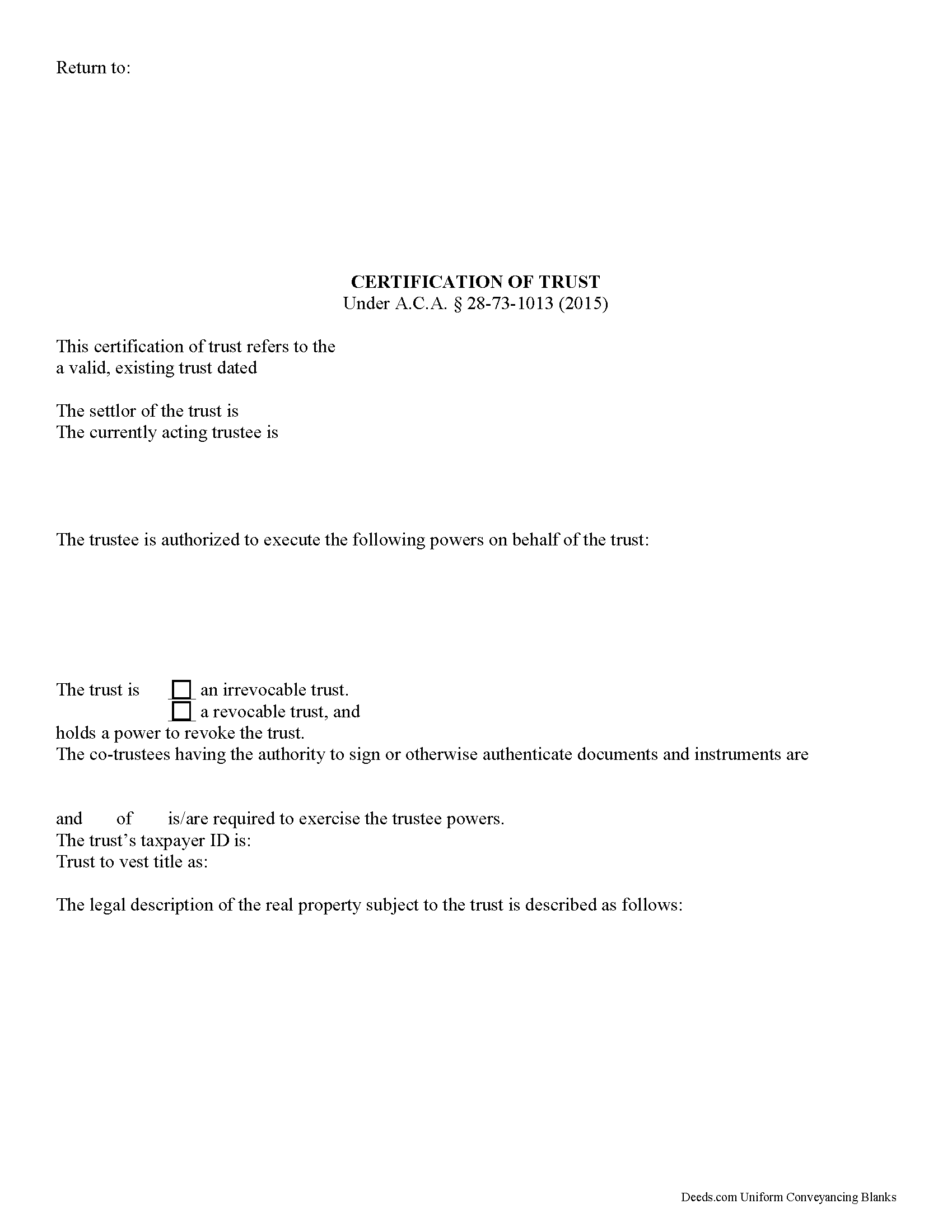
Under A.C.A. 28-73-1013, a trustee can furnish a certification of trust in lieu of the trust instrument to prove his or her authority to act on behalf of an established trust.
The certification is an official document a recipient can rely upon, and assume without inquiry the existence of the facts contained within (28-73-1013(f)(1)). The document contains only information about the trust deemed relevant to the immediate transaction for which it is requested. The recipient has the right to request excerpts from the trust document containing the information presented in the certificate, but this opens the recipient to certain liabilities (e),(h).
The certification includes basic information such as the name, date, and type (revocable or irrevocable) of the subject trust, and verifies that the trust has not been revoked, modified, or amended in any manner that would cause the representations contained in the certification of trust to be incorrect (c). It discloses the identities of the trust's settlor and all acting trustees, but maintains the confidentiality of anyone having a beneficial interest in the trust. The powers of the trustee relevant to the conveyance of trust prop... More Information about the Arkansas Certificate of Trust
Mineral Deed
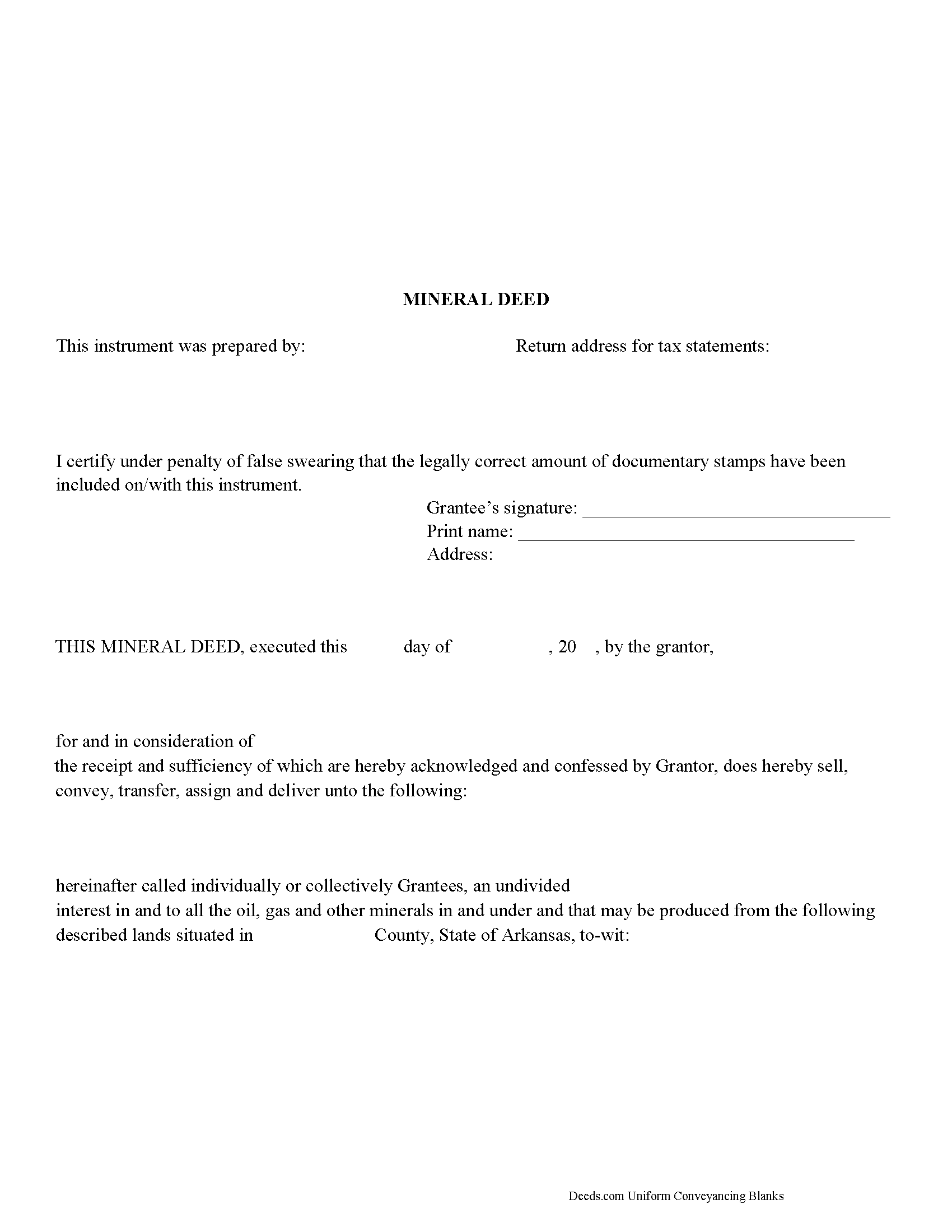
The General Mineral Deed in Arkansas transfers oil, gas, and mineral rights from the grantor to the grantee. THIS IS NOT A LEASE. There are no Exceptions or Reservations included.
The transfer includes the oil, gas and other minerals of every kind and nature. It also transfers any and all rights to receive royalties, overriding royalties, net profits interests or other payments out of or with respect to those oil, gas and other minerals. The Grantor can stipulate the percentage of Mineral Rights the Grantee will receive and is made subject to any rights existing under any valid and subsisting oil and gas lease or leases of record.
This general mineral deed gives the grantee the right to access, for the purpose of mining, drilling, exploring, operating and developing said lands for oil, gas, and other minerals, and storing handling, transporting and marketing of such.
In this document the Grantor Warrants and will defend said Title to Grantee. Use of this document has a permanent effect on your rights to the property, if you are not completely sure of what you are executing seek the advice of a legal professional.
(Arkansas Mineral Deed Package includes form, guidelines,... More Information about the Arkansas Mineral Deed
Mineral Deed with Quitclaim Covenants
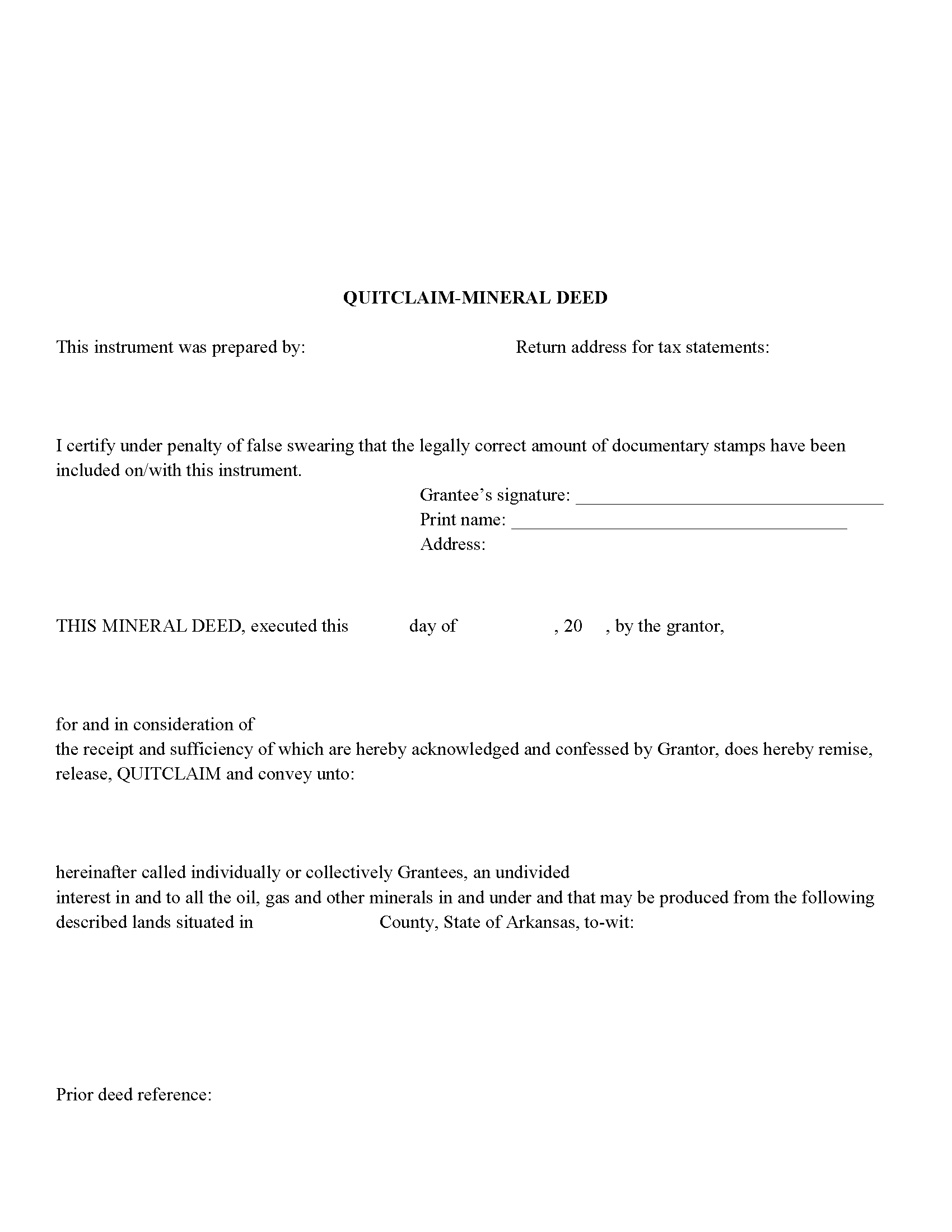
An Arkansas Mineral Quitclaim Deed (A.C.A. 14-15-402, 14-15-404) transfers oil, gas, and mineral rights from the grantor to the grantee. It is NOT A LEASE but a permanent ownership transfer.
Transfer and Rights: This deed includes oil, gas, and other minerals, with the grantor specifying the percentage of rights transferred to the grantee.
Access and Use: The grantee gains rights for mining, drilling, exploring, and developing the minerals, including their storage and transportation.
No Title Warranty: The grantor transfers rights without any title warranty (A.C.A. 18-12-104).
Uses: Mineral deeds with quitclaim are often used in situations where the grantor wants to quickly release any interest they might have in mineral rights, such as in settling estates, resolving disputes, clearing up uncertainties about ownership in a title's history or when mineral rights have previously been severed or fragmented from surface rights and cloud a title, making it difficult to transfer property. Resolution often involves the holder(s) of the mineral rights, quit-claiming any rights he/she/they have or might have in the subject property.
Legal Requirements: The deed requires speci... More Information about the Arkansas Mineral Deed with Quitclaim Covenants